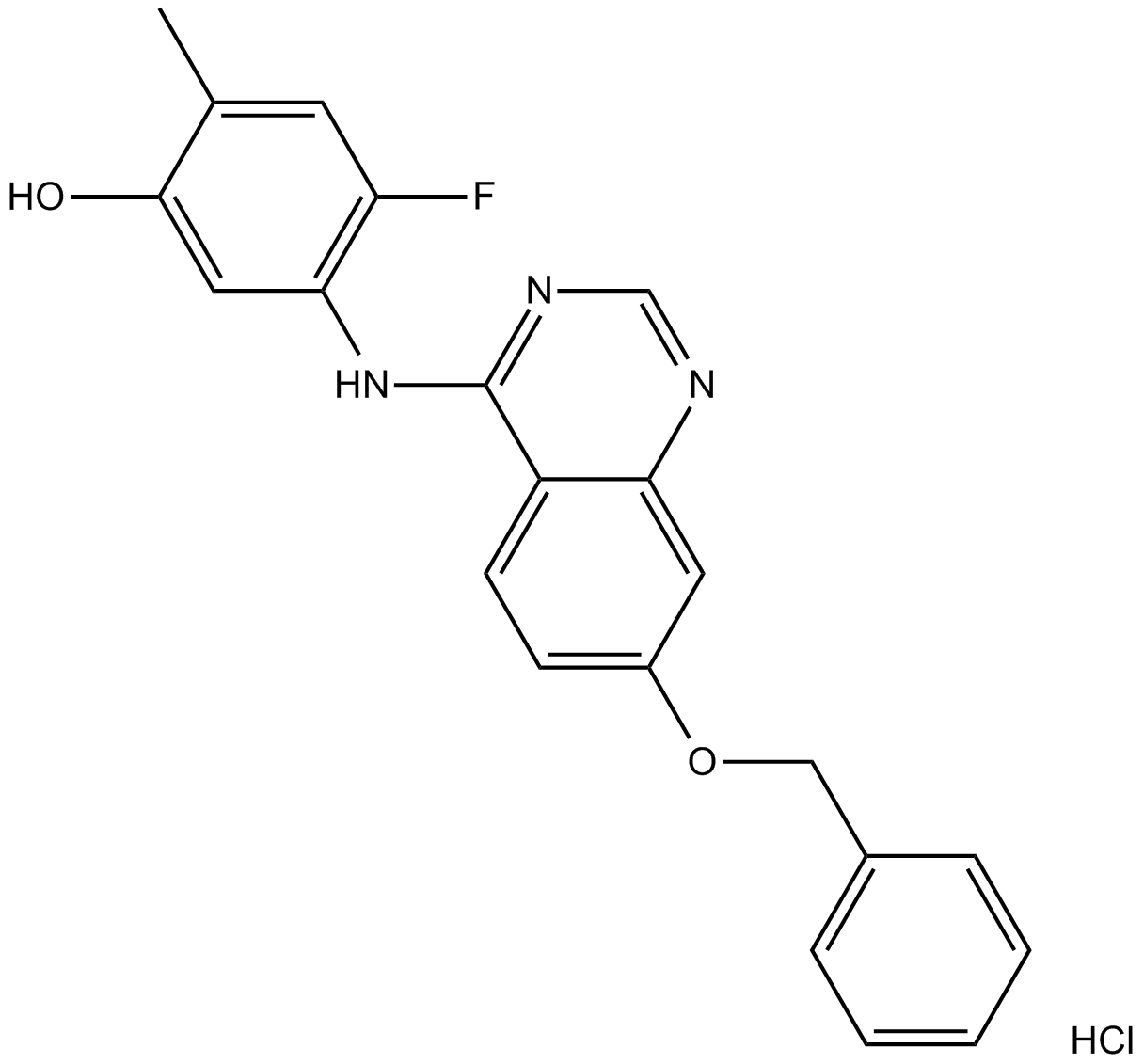c-MET
c-MET, also called MET, is a membrane receptor that is essential for embryonic development and wound healing.
Products for c-MET
- Cat.No. Product Name Information
-
GC14729
(R)-Crizotinib
A c-MET and ALK receptor tyrosine kinase inhibitor
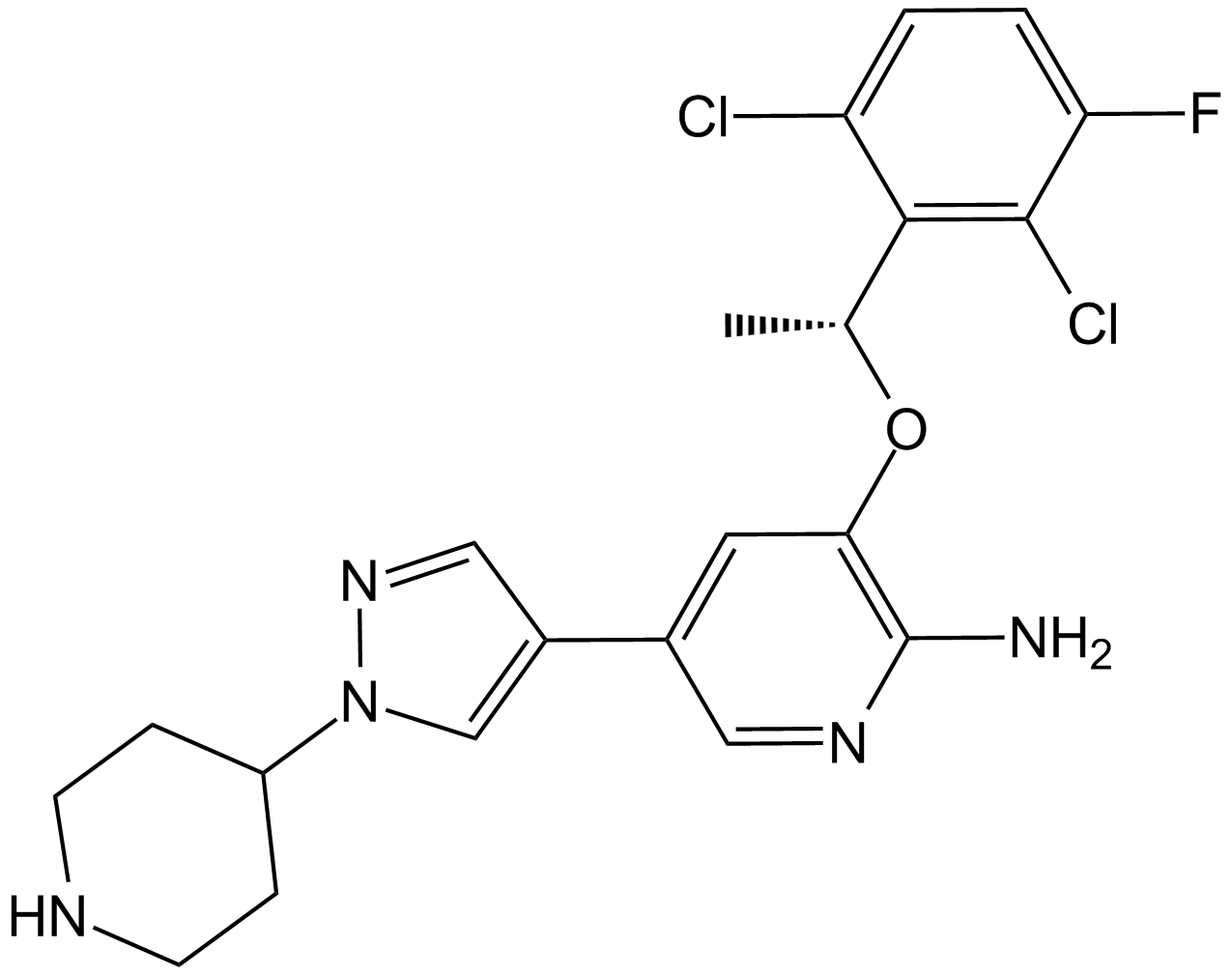
-
GC13136
(S)-Crizotinib
Potent MTH1 inhibitor
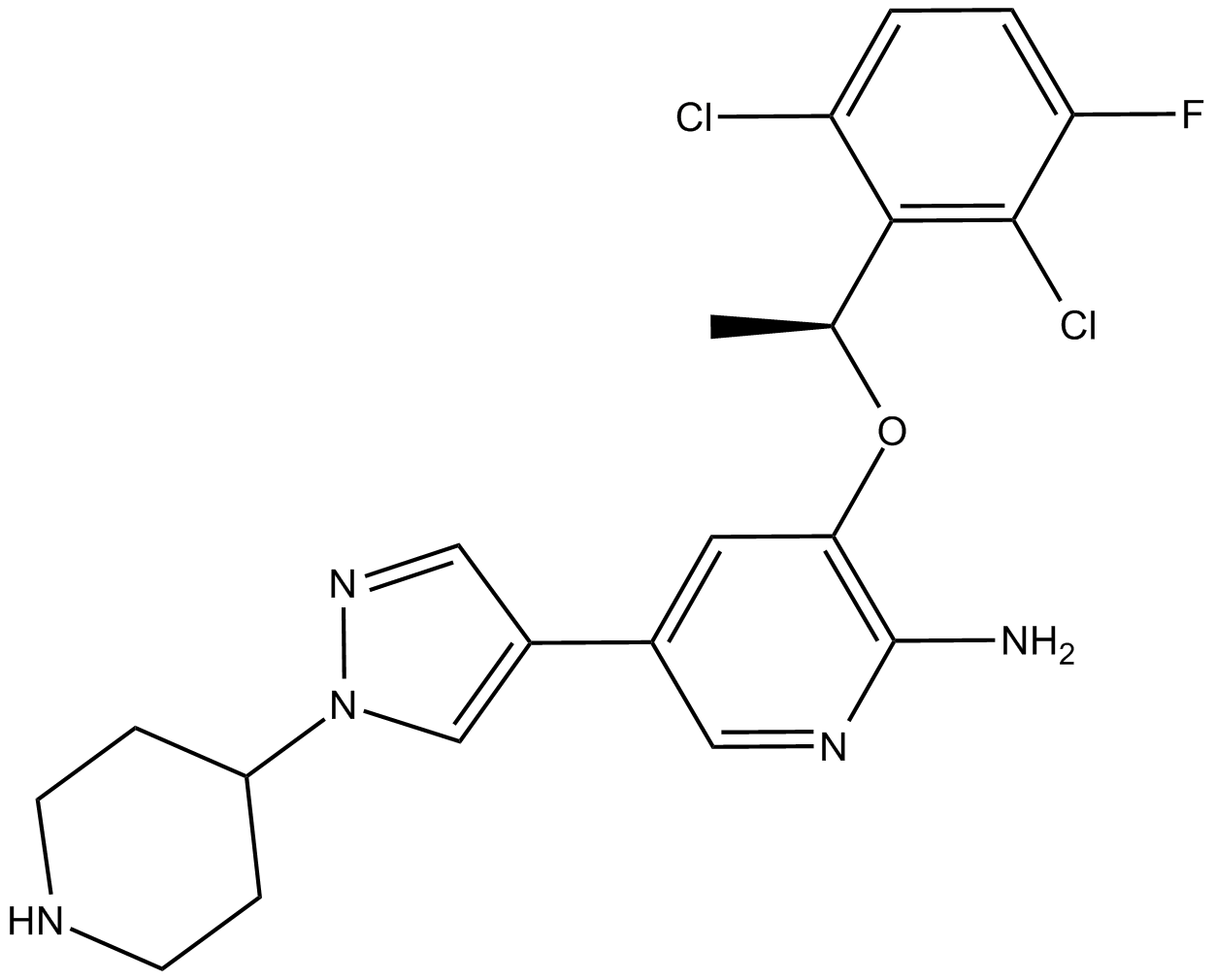
-
GC35095
2-Phospho-L-ascorbic acid trisodium salt
2-Phospho-L-ascorbic acid trisodium salt (2-Phospho-L-ascorbic acid trisodium) is a long-acting vitamin C derivative that can stimulate collagen formation and expression.
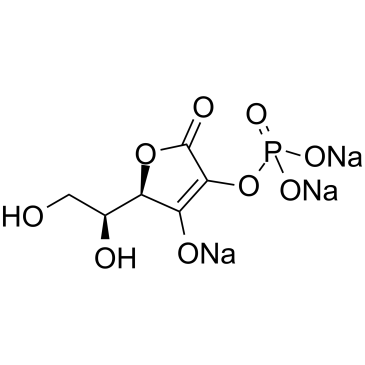
-
GC65894
ABN401
ABN401 is a highly potent and selective ATP-competitive c-MET inhibitor with an IC50 value of 10 nM. ABN401 has cytotoxic activity against MET-addicted cancer cells. ABN401 can inhibit c-MET phosphorylation in tumor tissues. ABN401 can be used for researching anticancer.

-
GC16604
Altiratinib
c-MET/TIE-2/VEGFR inhibitor
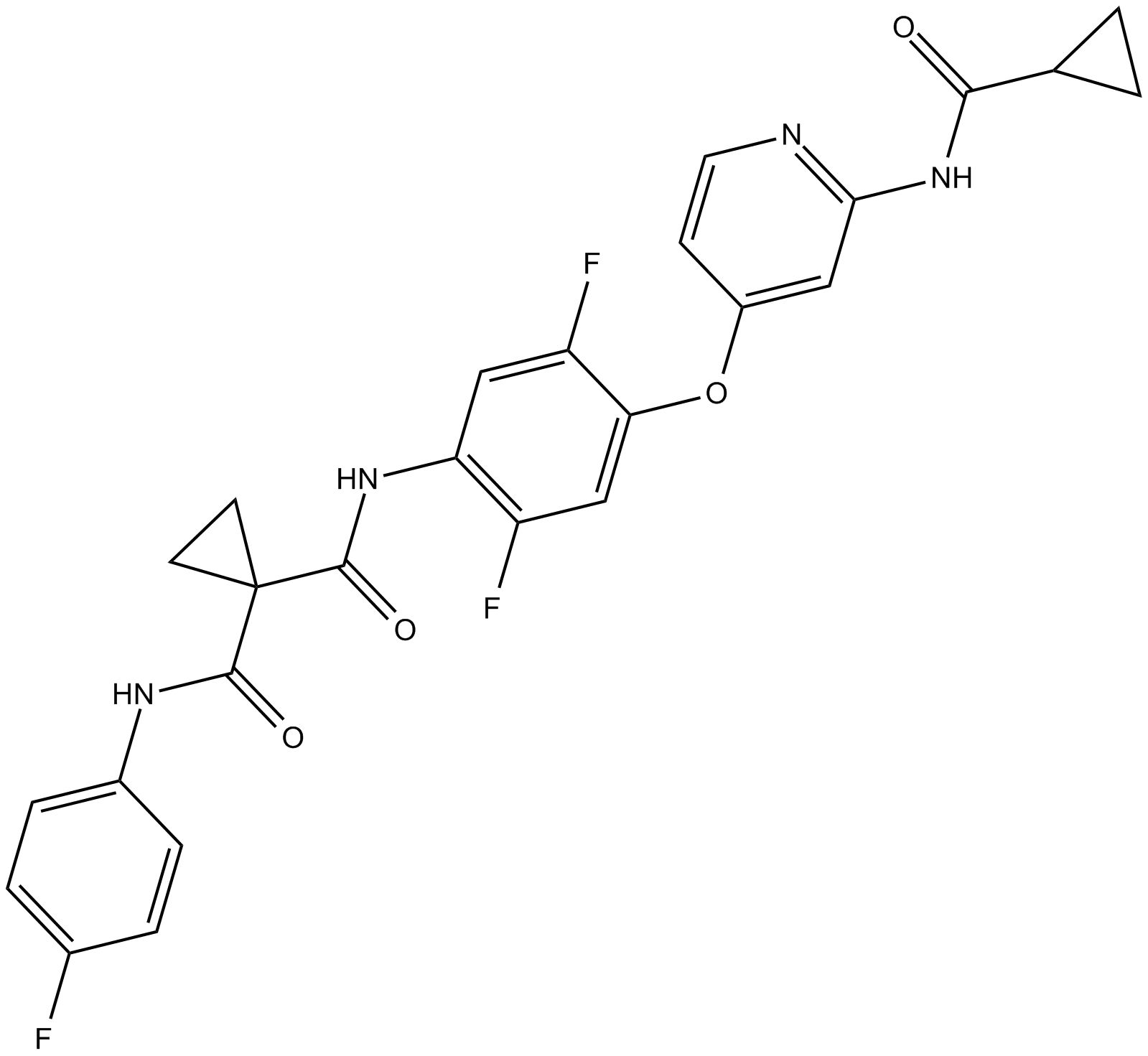
-
GC15655
AMG 337
MET inhibitor
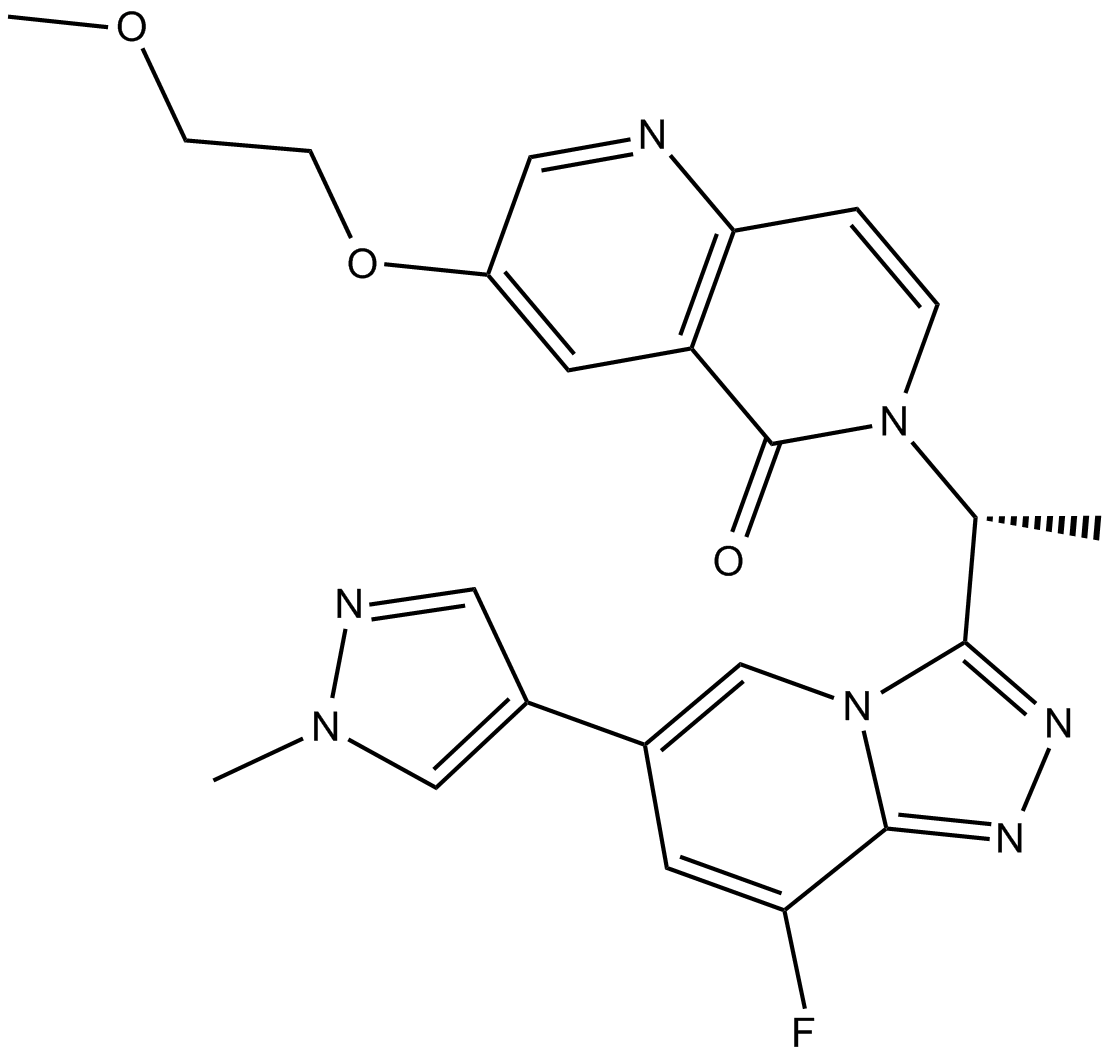
-
GC12600
AMG-208
C-Met inhibitor,potent and highly selective
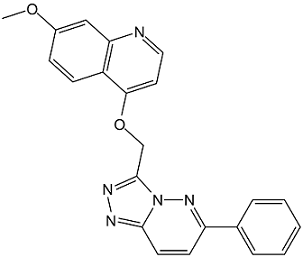
-
GC11481
AMG-458
Potent c-Met inhibitor
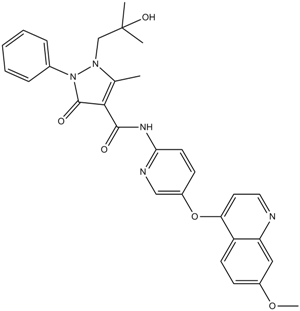
-
GC16391
Amuvatinib (MP-470, HPK 56)
A multi-targeted RTK inhibitor
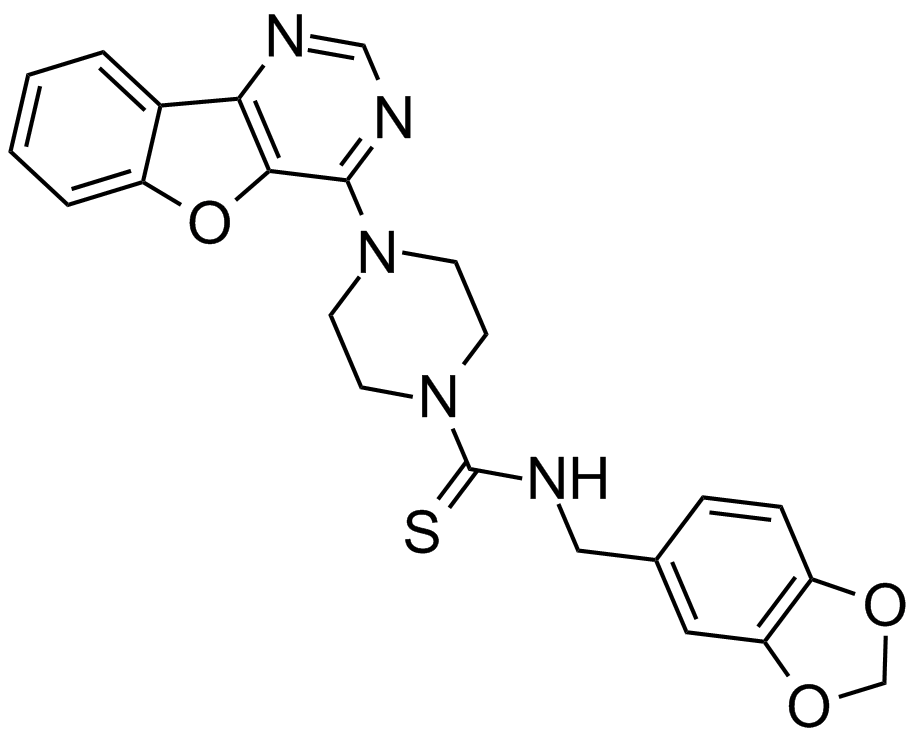
-
GC33362
Amuvatinib hydrochloride (MP470 hydrochloride)
Amuvatinib hydrochloride (MP470 hydrochloride) (MP470 hydrochloride) is an orally bioavailable multi-targeted tyrosine kinase inhibitor with potent activity against mutant c-Kit, PDGFRα, Flt3, c-Met and c-Ret. Amuvatinib hydrochloride (MP470 hydrochloride) (MP470 hydrochloride) is also a DNA repair suppressor through suppression of DNA repair protein RAD51, thereby disrupting DNA damage repair. Antineoplastic activity.
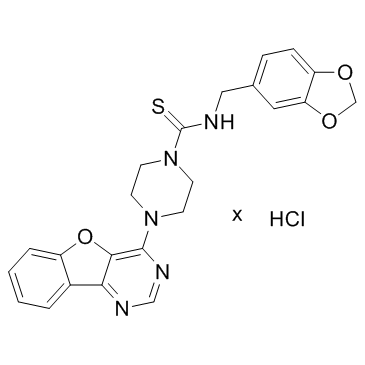
-
GC14214
BMS-777607
BMS-777607 is a pan-TAM inhibitor, which shows anti-tumor activity to different types of cancer.
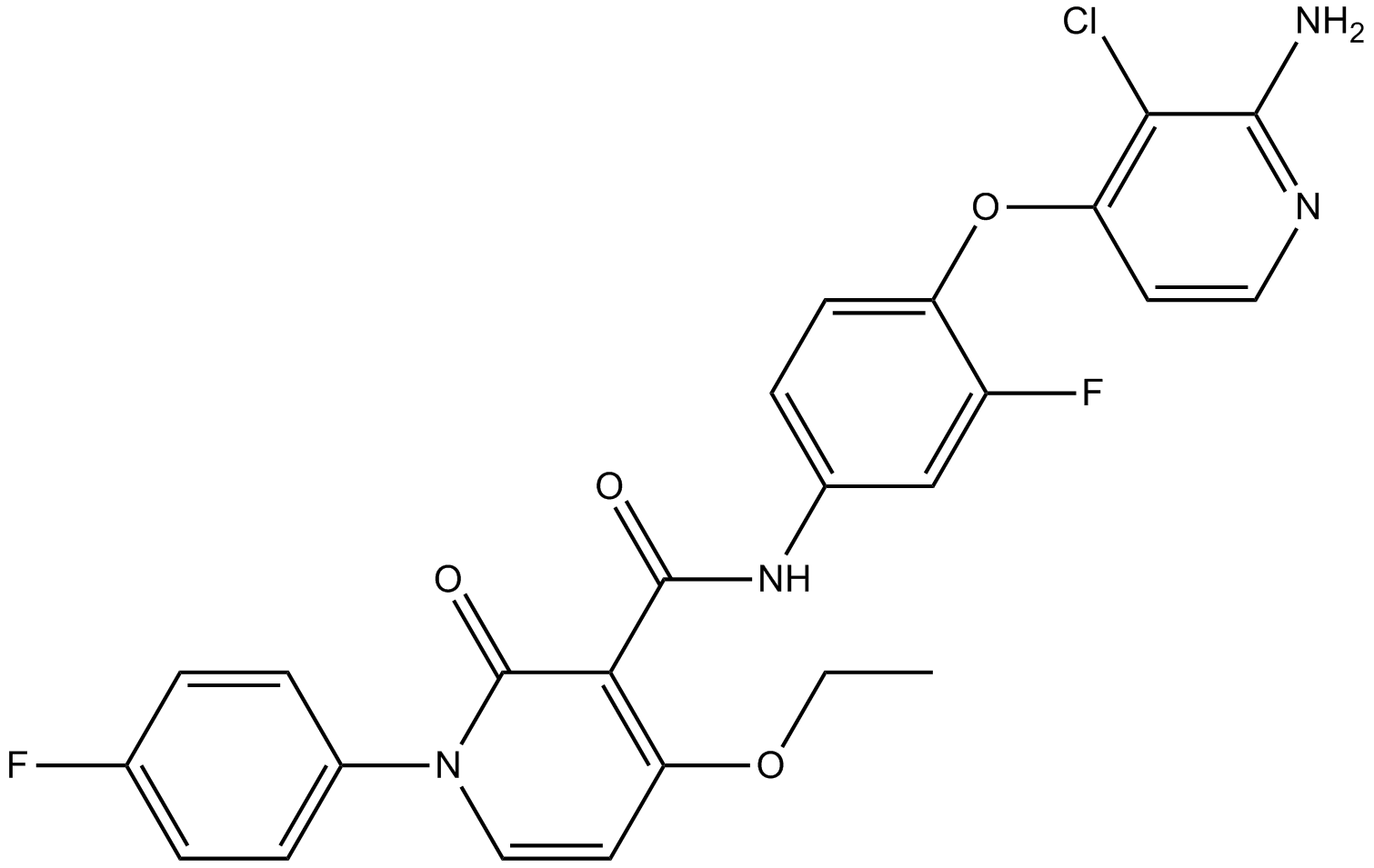
-
GC13833
BMS-794833
Met/VEGFR-2 inhibitor,potent and ATP-competitive
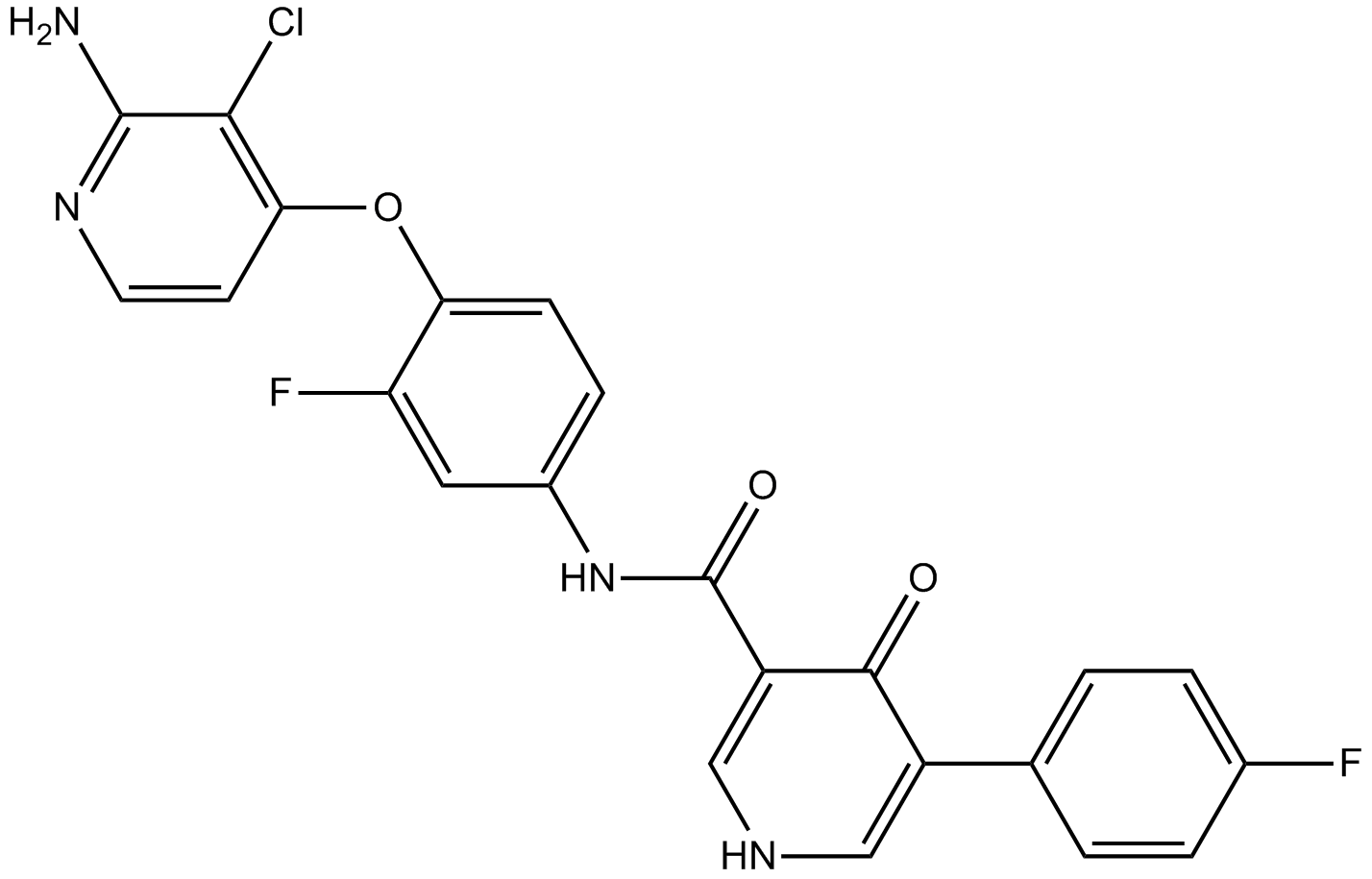
-
GC17772
BMS-817378
Potent ATP competitive inhibitor of Met/VEGFR2
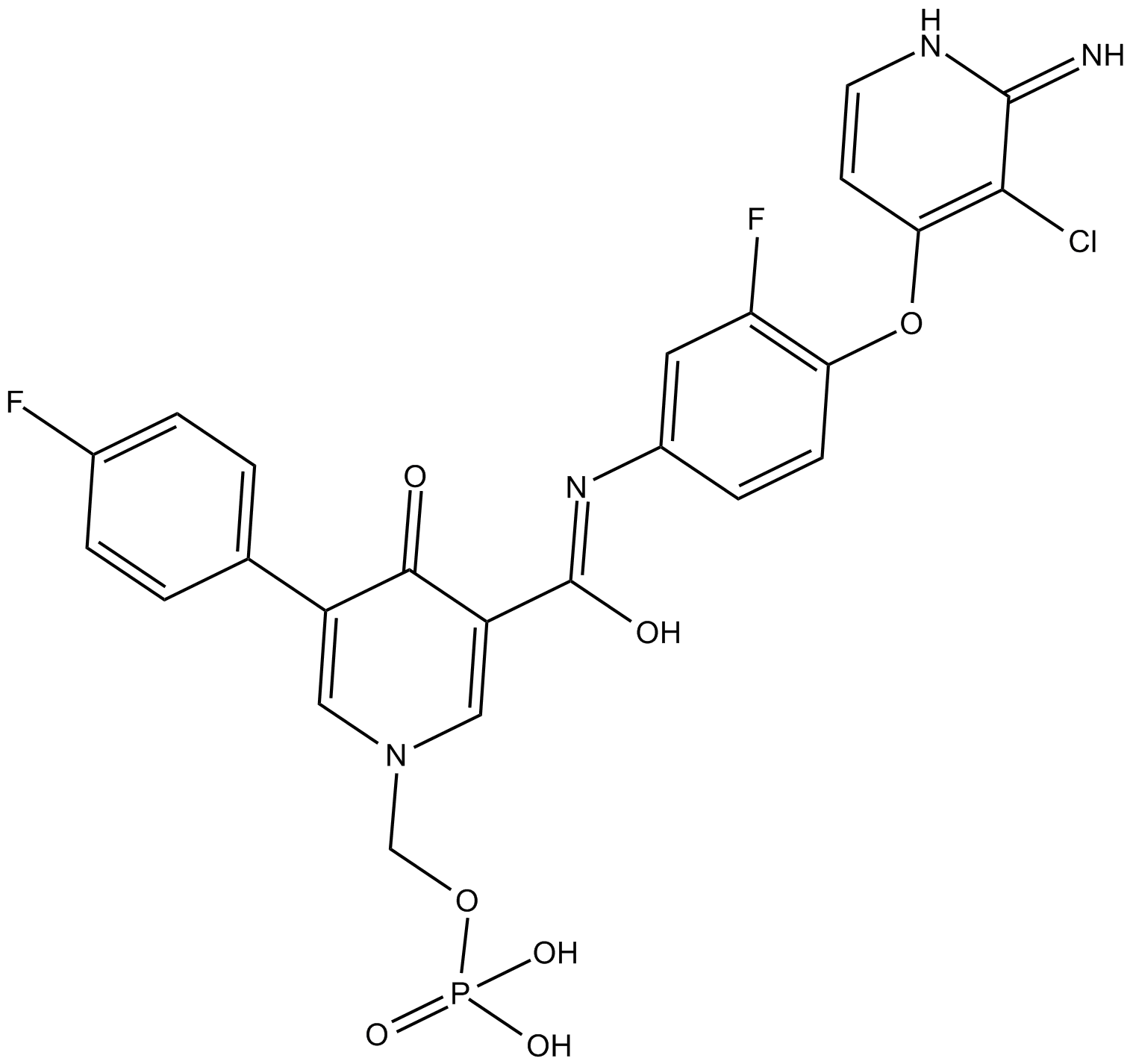
-
GC38894
Bozitinib
Bozitinib (PLB-1001) is a highly selective c-MET kinase inhibitor with blood-brain barrier permeability. Bozitinib (PLB-1001) is a ATP-competitive small-molecule inhibitor, binds to the conventional ATP-binding pocket of the tyrosine kinase superfamily.
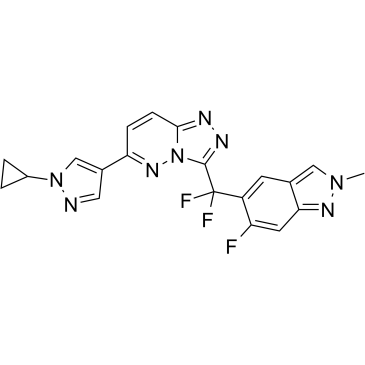
-
GC65966
BPI-9016M
BPI-9016M is a potent, orally active, and selective dual c-Met and AXL tyrosine kinases inhibitor. BPI-9016M suppresses tumor cell growth, migration and invasion of lung adenocarcinoma.
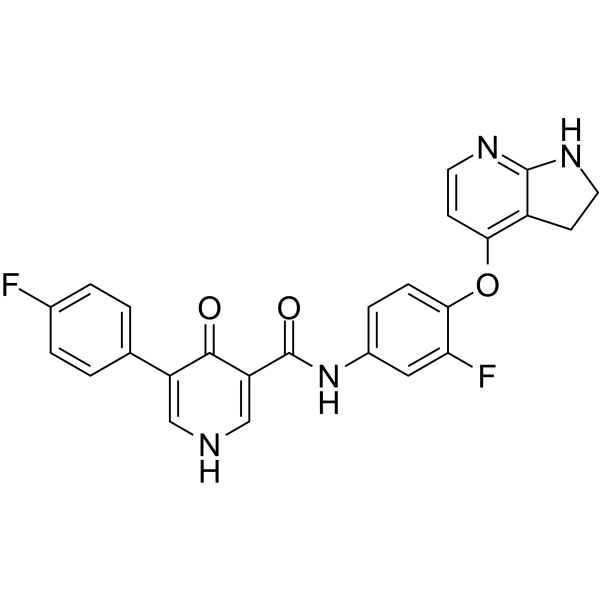
-
GC19106
c-Kit-IN-1
c-Kit-IN-1 is a potent inhibitor of c-Kit and c-Met with IC50s of <200 nM.
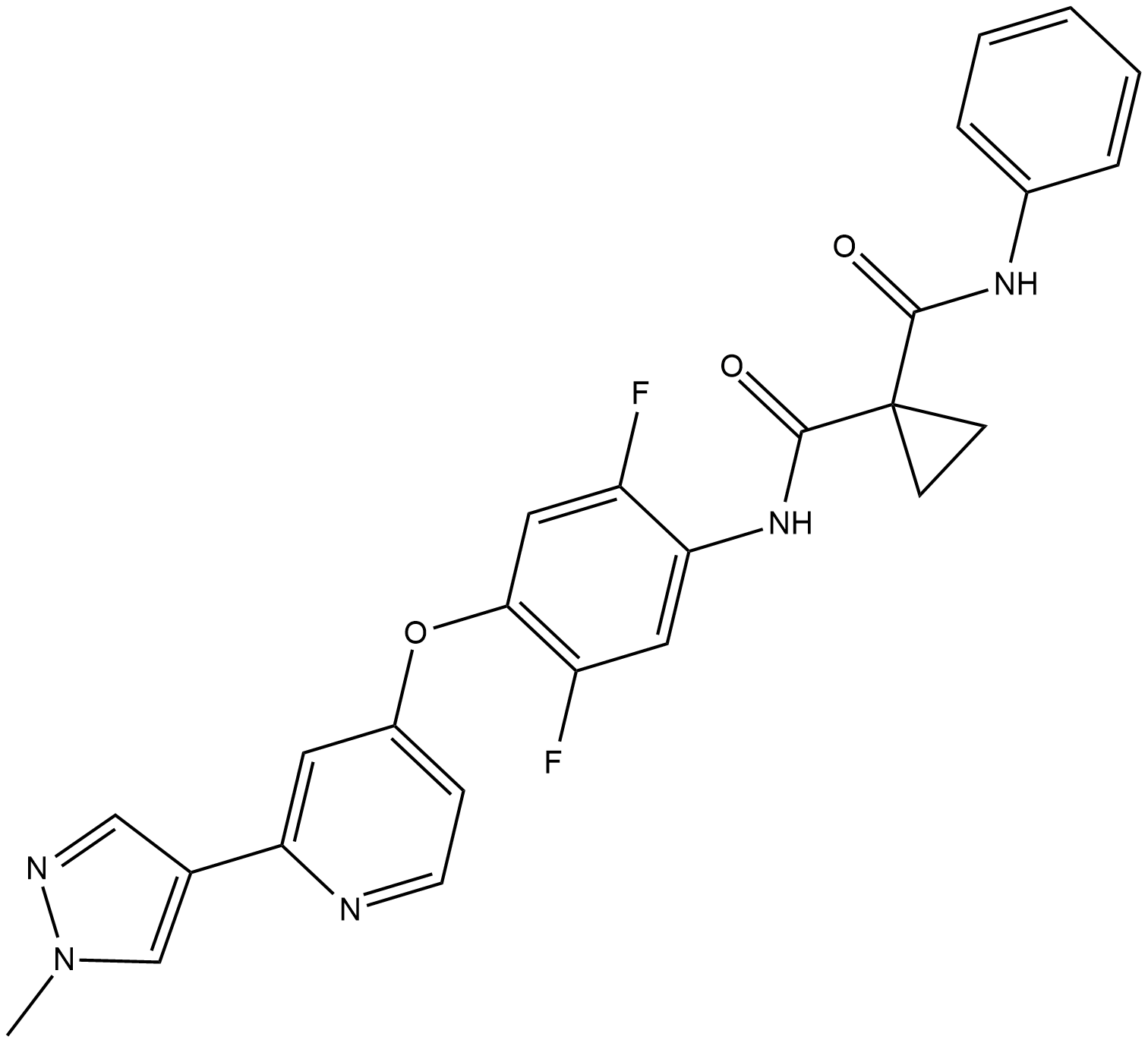
-
GC35716
c-Met inhibitor 1
c-Met inhibitor 1 is an inhibitor of the c-Met receptor signaling pathway useful for the treatment of cancer including gastric, glioblastoma, and pancreatic cancer.
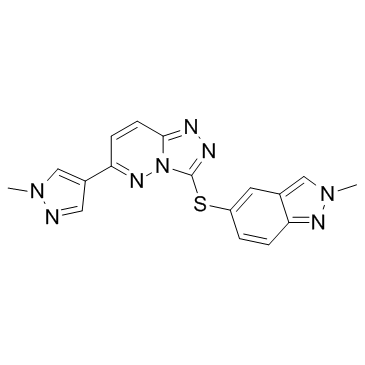
-
GC35717
c-met-IN-1
c-met-IN-1 (compound 16) is a potent and selective c-Met inhibitor, with IC50 of 1.1 nM, with antitumor activity..
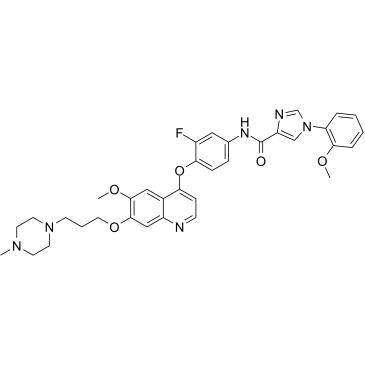
-
GC33203
c-Met-IN-2
c-Met-IN-2 is a potent, selective and orally available c-Met inhibitor, with an IC50 of 0.6 nM, with antitumor activity.
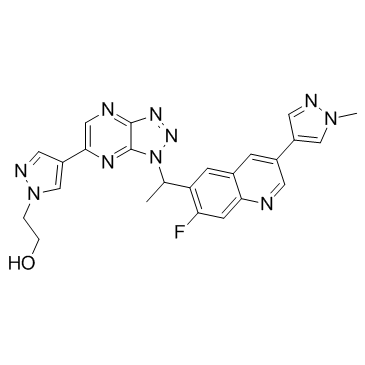
-
GC15779
Cabozantinib (XL184, BMS-907351)
Cabozantinib (XL184, BMS-907351) is a potent and orally active inhibitor of VEGFR2 and MET, with IC50 values of 0.035, and 1.3 nM, respectively. Cabozantinib (XL184, BMS-907351) displays strong inhibition of KIT, RET, AXL, TIE2, and FLT3 (IC50=4.6, 5.2, 7, 14.3, and 11.3 nM, respectively). Cabozantinib (XL184, BMS-907351) shows antiangiogenic activity. Cabozantinib (XL184, BMS-907351) disrupts tumor vasculature and promotes tumor and endothelial cell apoptosis.
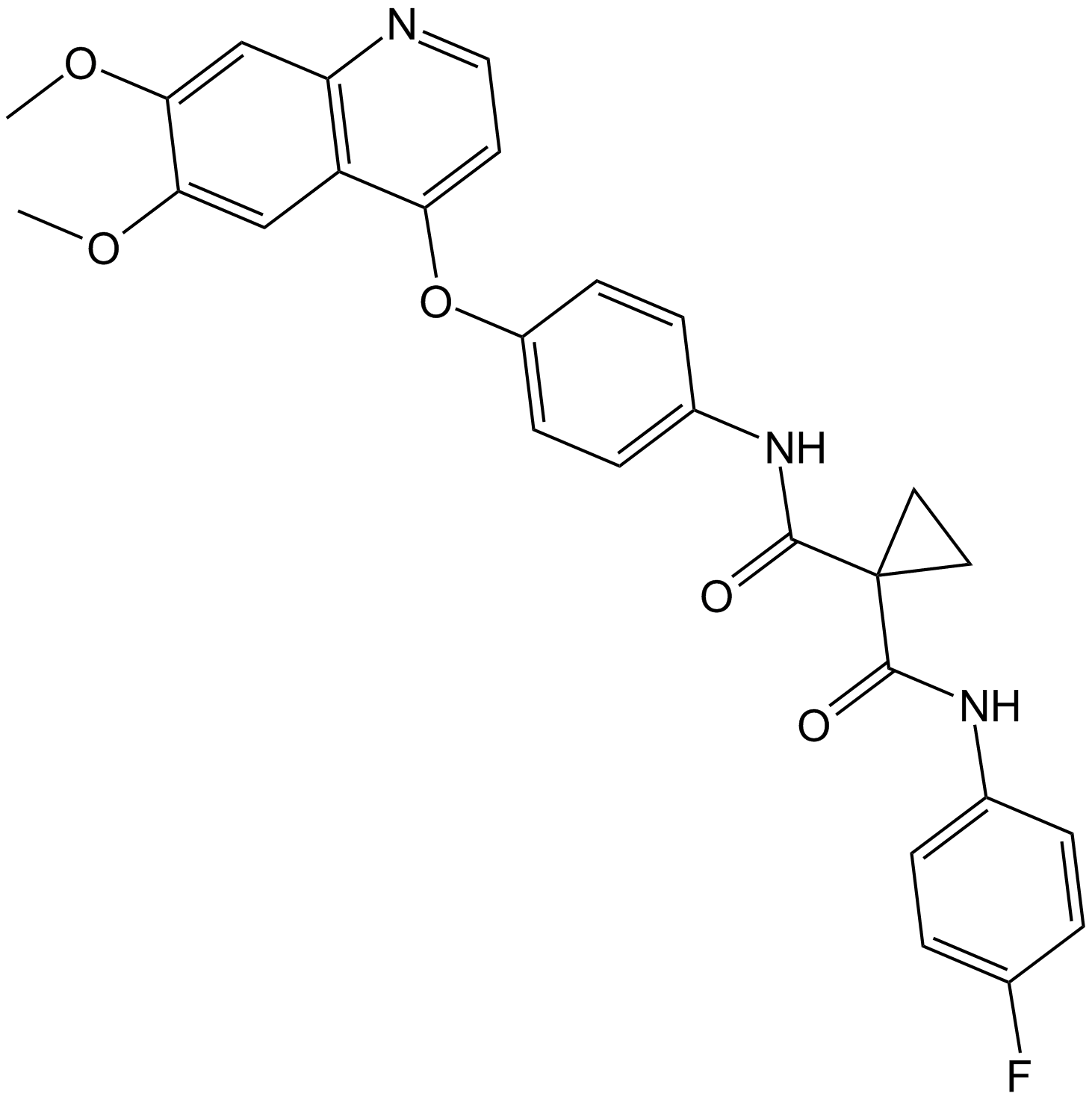
-
GC12531
Cabozantinib malate (XL184)
Cabozantinib malate (XL184) (XL184 S-malate) is a potent multiple receptor tyrosine kinases inhibitor that inhibits VEGFR2, c-Met, Kit, Axl and Flt3 with IC50s of 0.035, 1.3, 4.6, 7 and 11.3 nM, respectively.
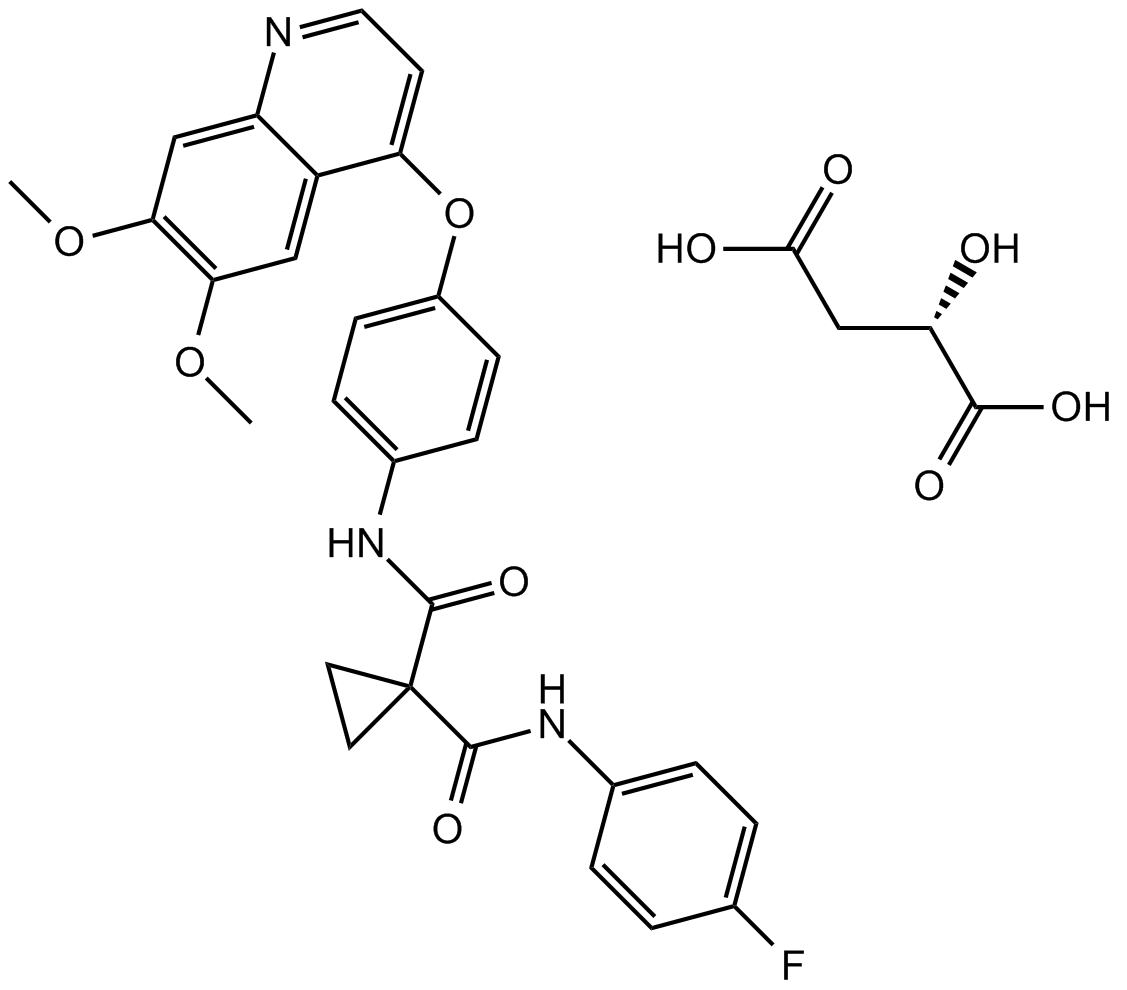
-
GC19102
CEP-40783
CEP-40783 is a potent, selective and orally available inhibitor of AXL and c-Met with IC50 values of 7 nM and 12 nM, respectively.
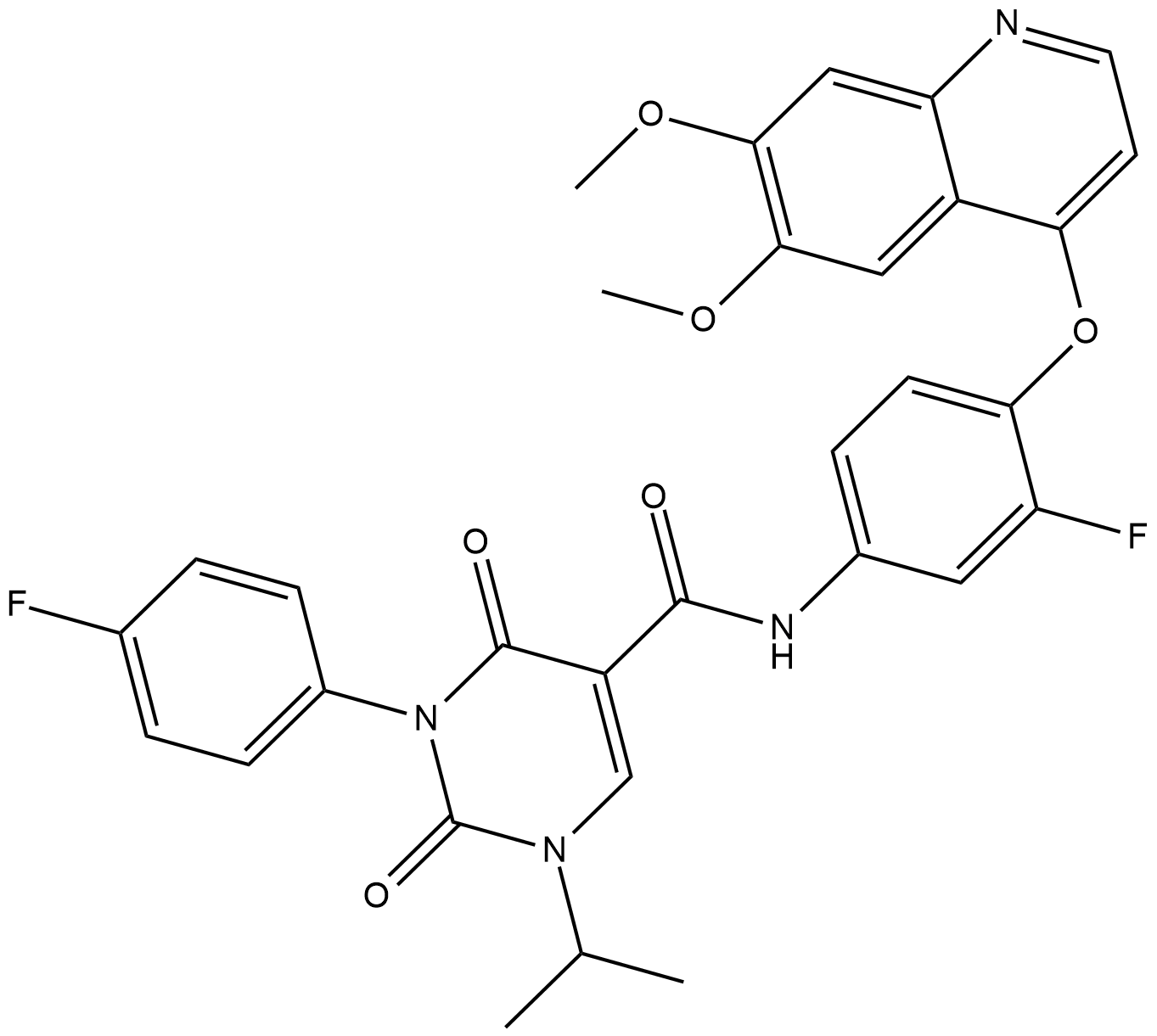
-
GC12616
Crizotinib hydrochloride
inhibitor of the c-Met kinase and the NPM-ALK
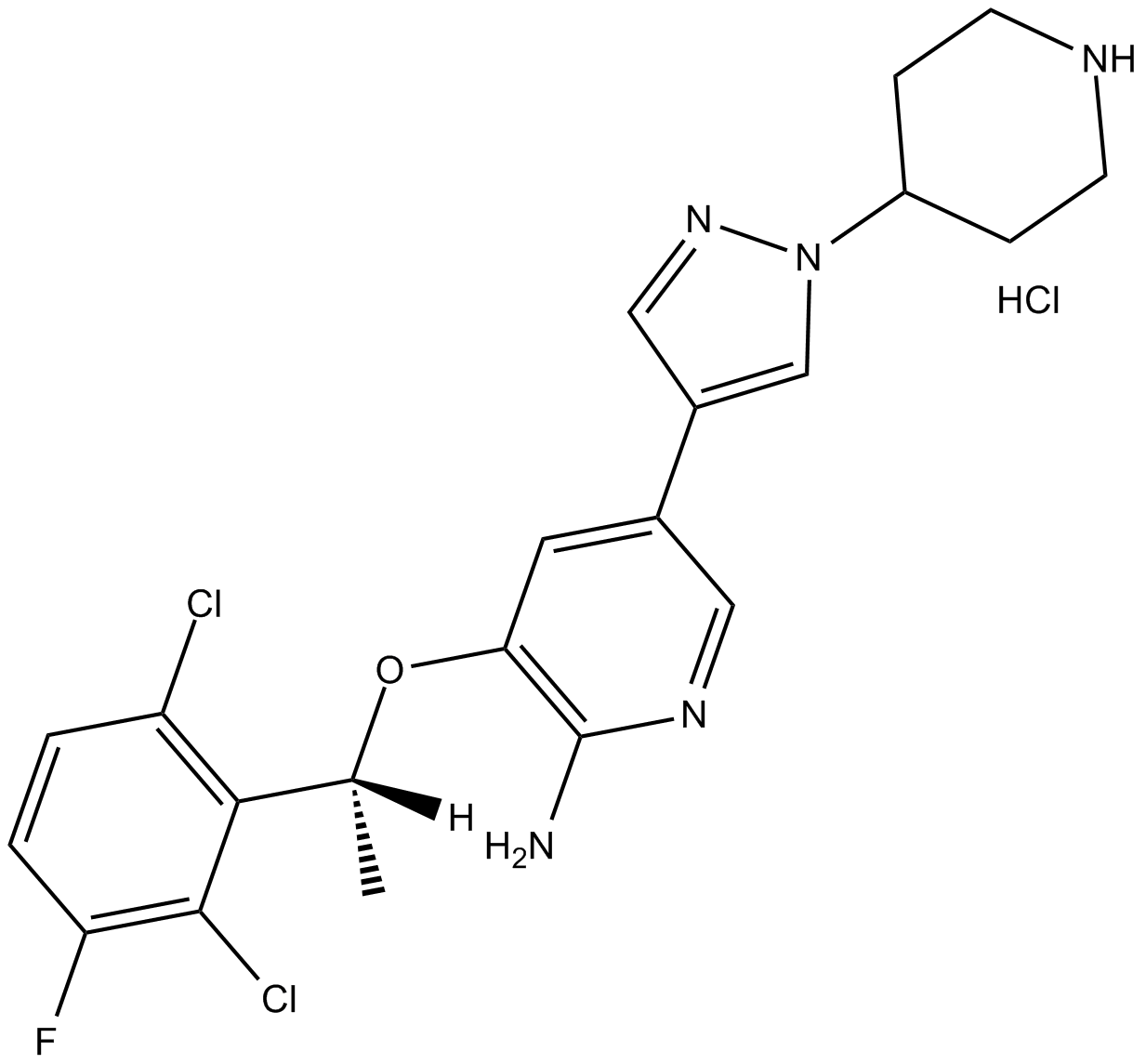
-
GC64961
CSF1R-IN-2
CSF1R-IN-2 (compound 5) is an oral-active inhibitor of SRC, MET and c-FMS, with IC50 values of 0.12 nM, 0.14 nM and 0.76 nM for SRC, MET and c-FMS respectively.
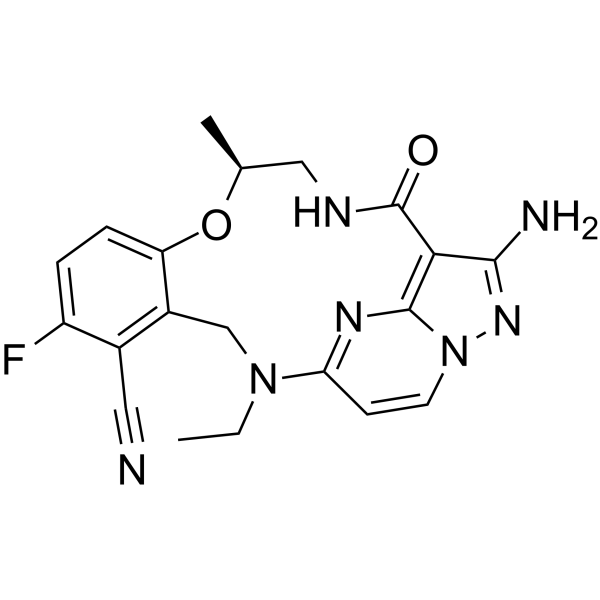
-
GC30768
Dihexa (PNB-0408)
Dihexa (PNB-0408) (N-hexanoic-Tyr-Ile-(6)-amino hexanoic amide) is an oral active, blood-brain barrier-permeable angiotensin IV analogue.
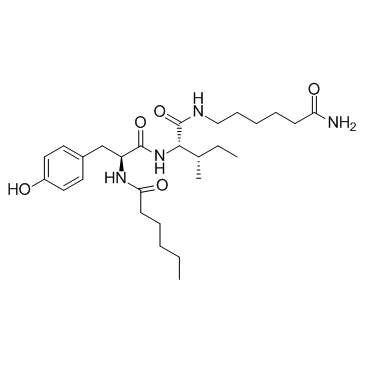
-
GC62597
DS-1205b free base
DS-1205b free base is a potent and selective inhibitor of AXL kinase, with an IC50 of 1.3 nM. DS-1205b free base also inhibits MER, MET, and TRKA, with IC50s of 63, 104, and 407 nM, respectively. DS-1205b free base can inhibit cell migration in vitro and tumor growth in vivo.
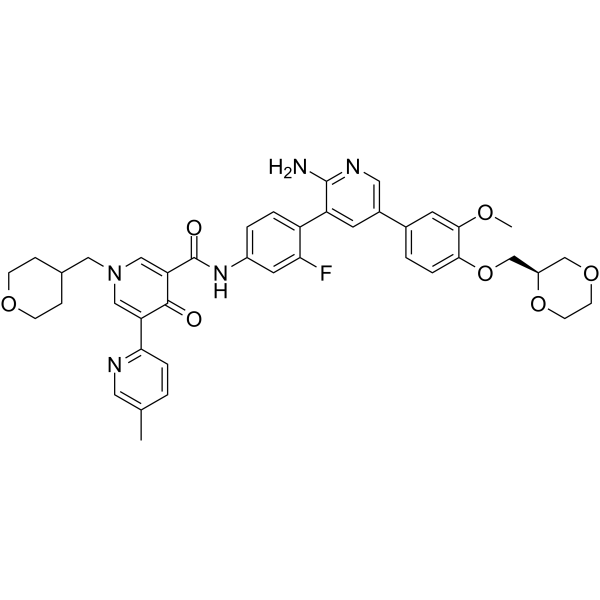
-
GC10466
EMD-1214063
EMD-1214063 (Tepotinib, MSC2156119J) is a novel potent and highly selective reversible, ATP-competitive small molecule c-Met inhibitor .
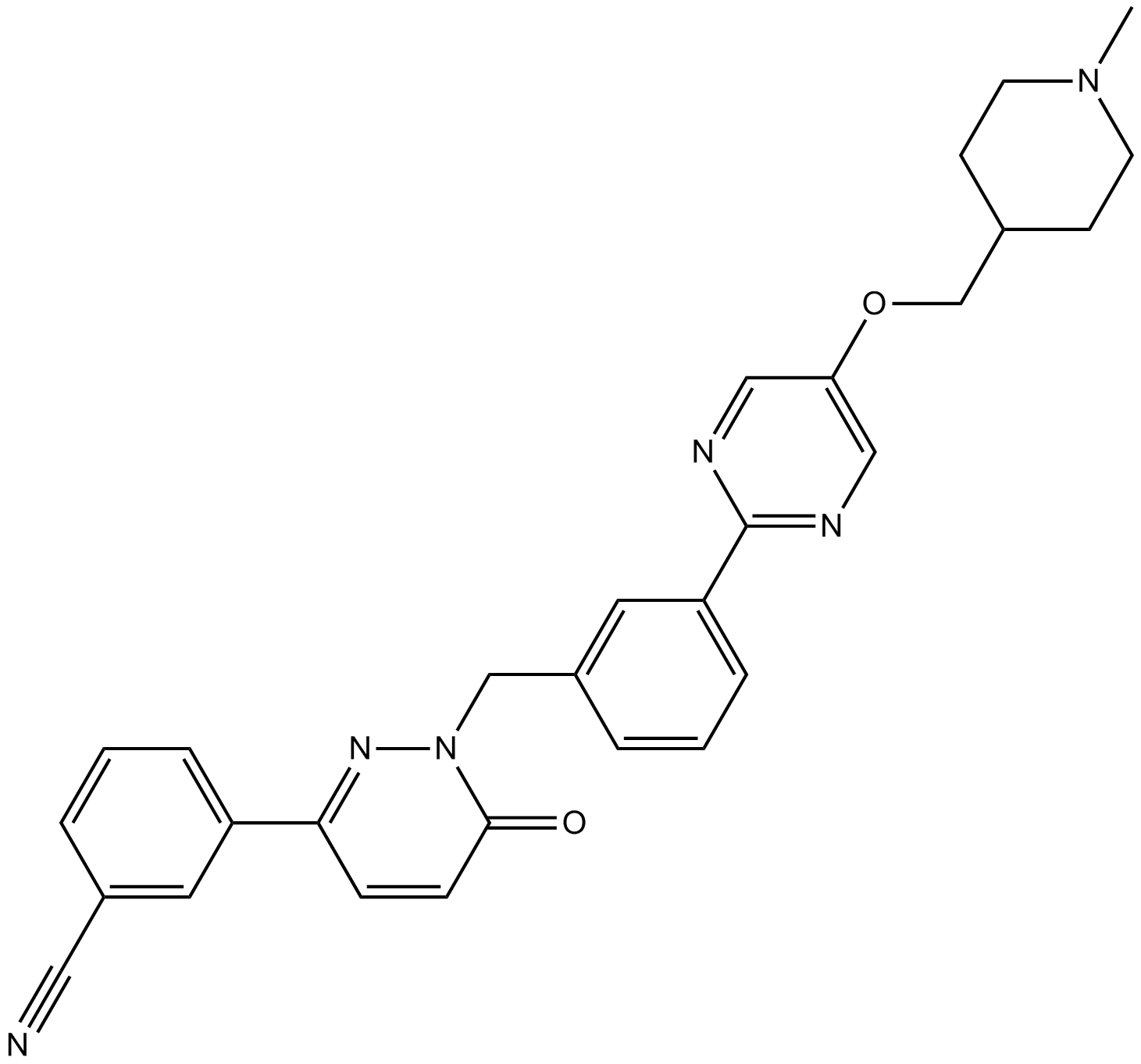
-
GC33190
Ensartinib (X-396)
Ensartinib (X-396) (X-396) is a potent and dual ALK/MET inhibitor with IC50s of <0.4 nM and 0.74 nM, respectively.
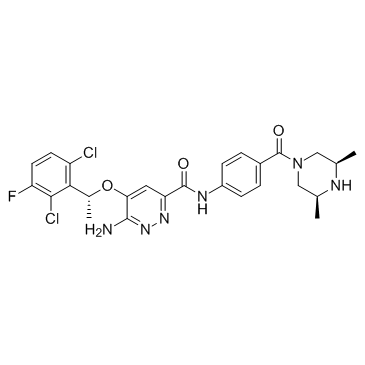
-
GC32864
Ensartinib hydrochloride (X-396 hydrochloride)
Ensartinib hydrochloride (X-396 hydrochloride) (X-396 dihydrochloride) is a potent and dual ALK/MET inhibitor with IC50s of <0.4 nM and 0.74 nM, respectively.
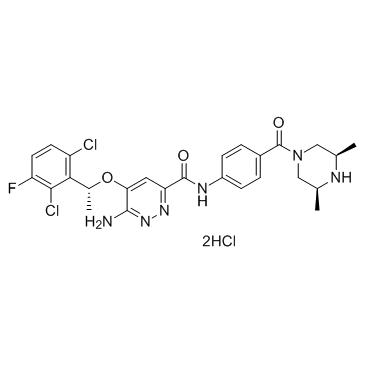
-
GC15735
Foretinib (GSK1363089)
Foretinib (GSK1363089) is a multi-target tyrosine kinase inhibitor with IC50s of 0.4 nM and 0.9 nM for Met and KDR.
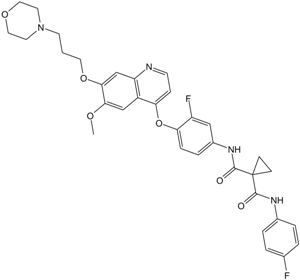
-
GC64708
Fosgonimeton
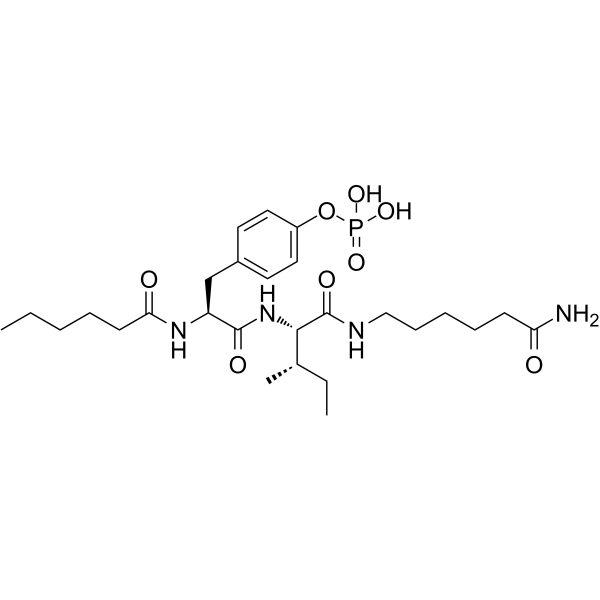
-
GC65478
Gemnelatinib
Gemnelatinib is a tyrosine kinase inhibitor (WO2018077227, implementation example 1). Gemnelatinib can be used for the research of cancer.
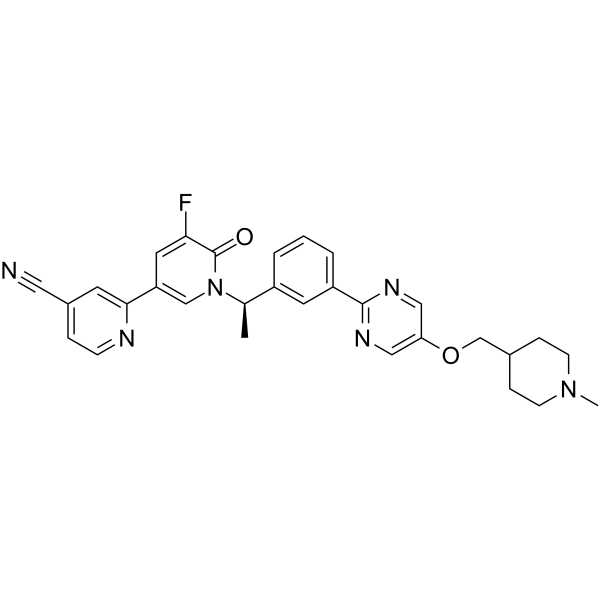
-
GC19166
Glesatinib hydrochloride
Glesatinib hydrochloride is an inhibitor of the MET and Axl receptor tyrosine kinase pathways, which drive tumour growth when altered.
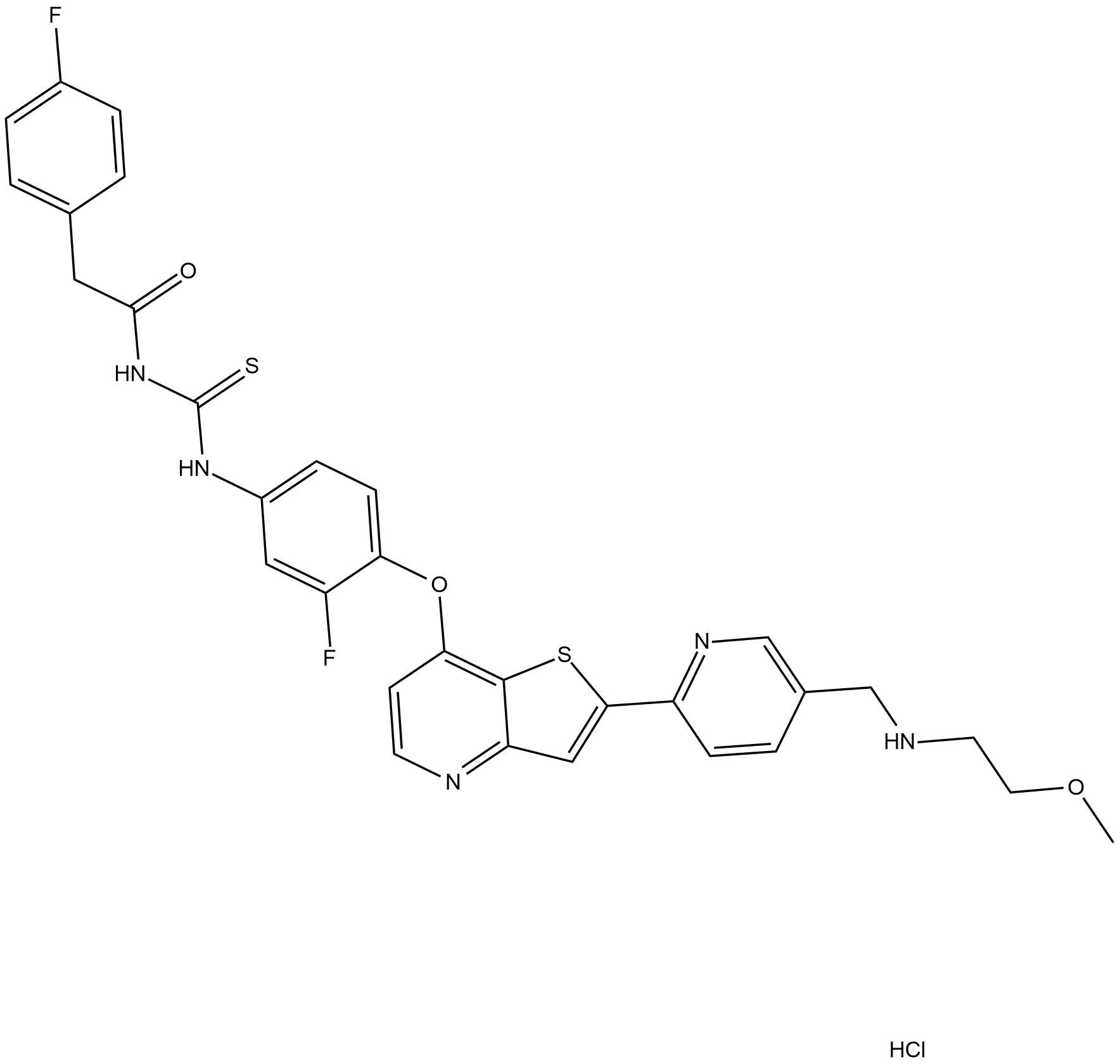
-
GC64947
Glumetinib
Glumetinib (SCC244) is a highly selective, orally bioavailable, ATP-competitive c-Met inhibitor with an IC50 of 0.42 nM. Glumetinib has greater than 2400-fold selectivity for c-Met over those 312 kinases evaluated, including the c-Met family member RON and highly homologous kinases Axl, Mer, TyrO3. Antitumor activity.
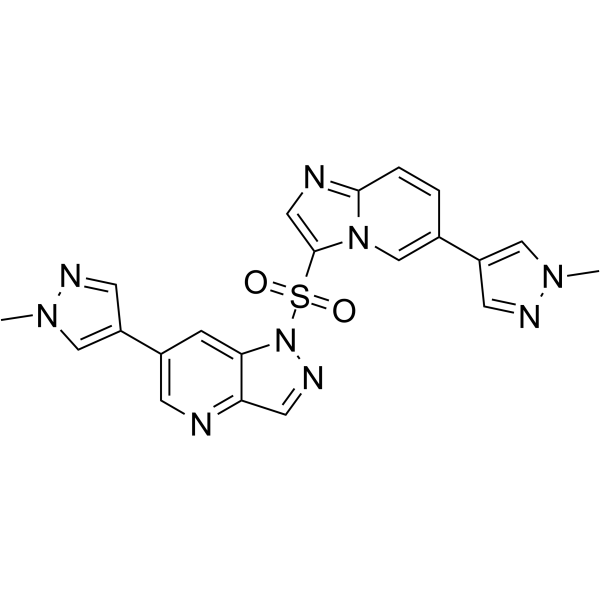
-
GC17715
Golvatinib (E7050)
Golvatinib (E7050) (E-7050) is a potent dual inhibitor of both c-Met and VEGFR2 kinases with IC50s of 14 and 16 nM, respectively.
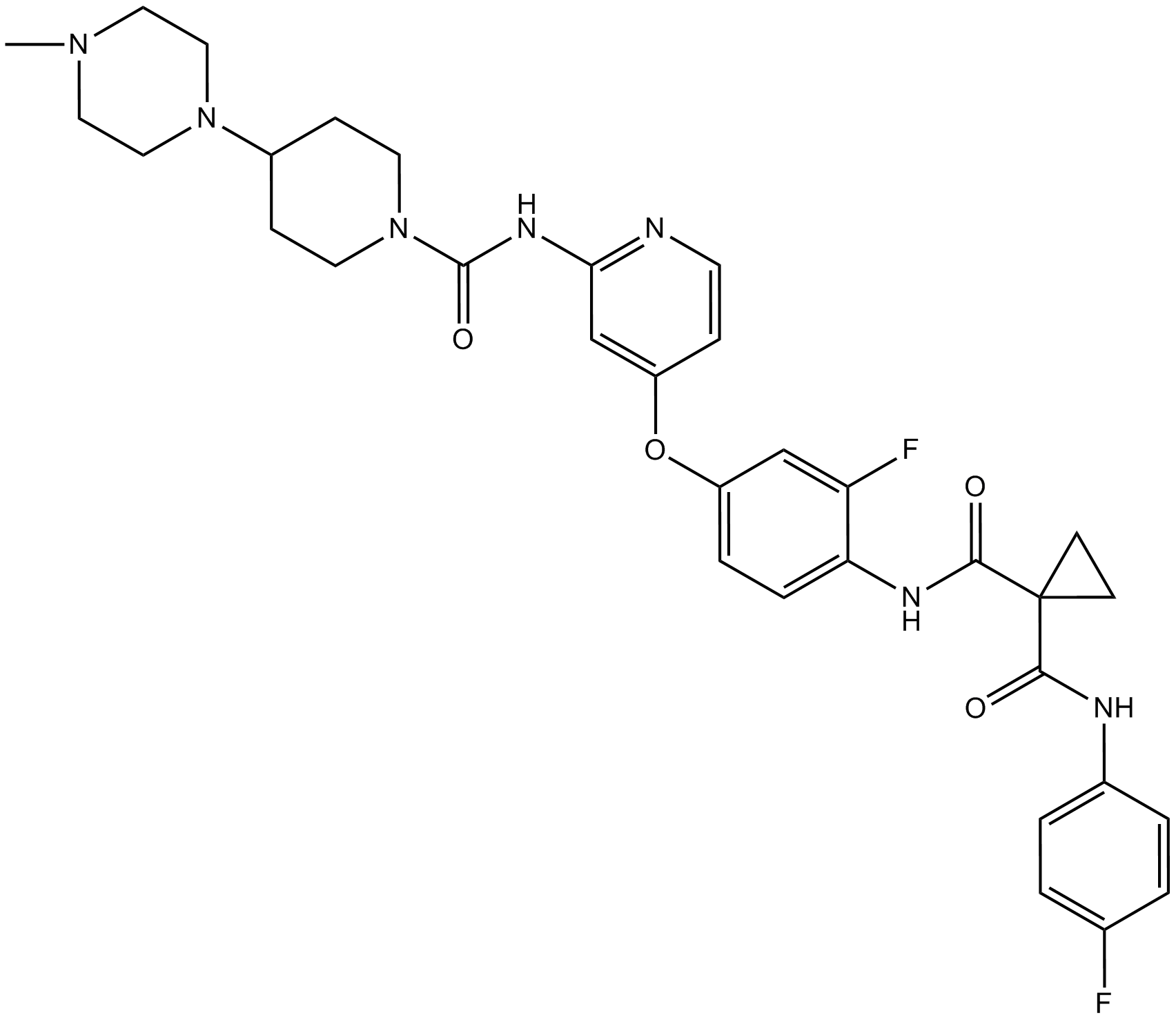
-
GC17866
INCB28060
INCB28060 (INC280; INCB28060) is a potent, orally active, selective, and ATP competitive c-Met kinase inhibitor (IC50=0.13 nM). INCB28060 can inhibit phosphorylation of c-MET as well as c-MET pathway downstream effectors such as ERK1/2, AKT, FAK, GAB1, and STAT3/5. INCB28060 potently inhibits c-MET-dependent tumor cell proliferation and migration and effectively induces apoptosis. Antitumor activity. INCB28060 is largely metabolized by CYP3A4 and aldehyde oxidase.
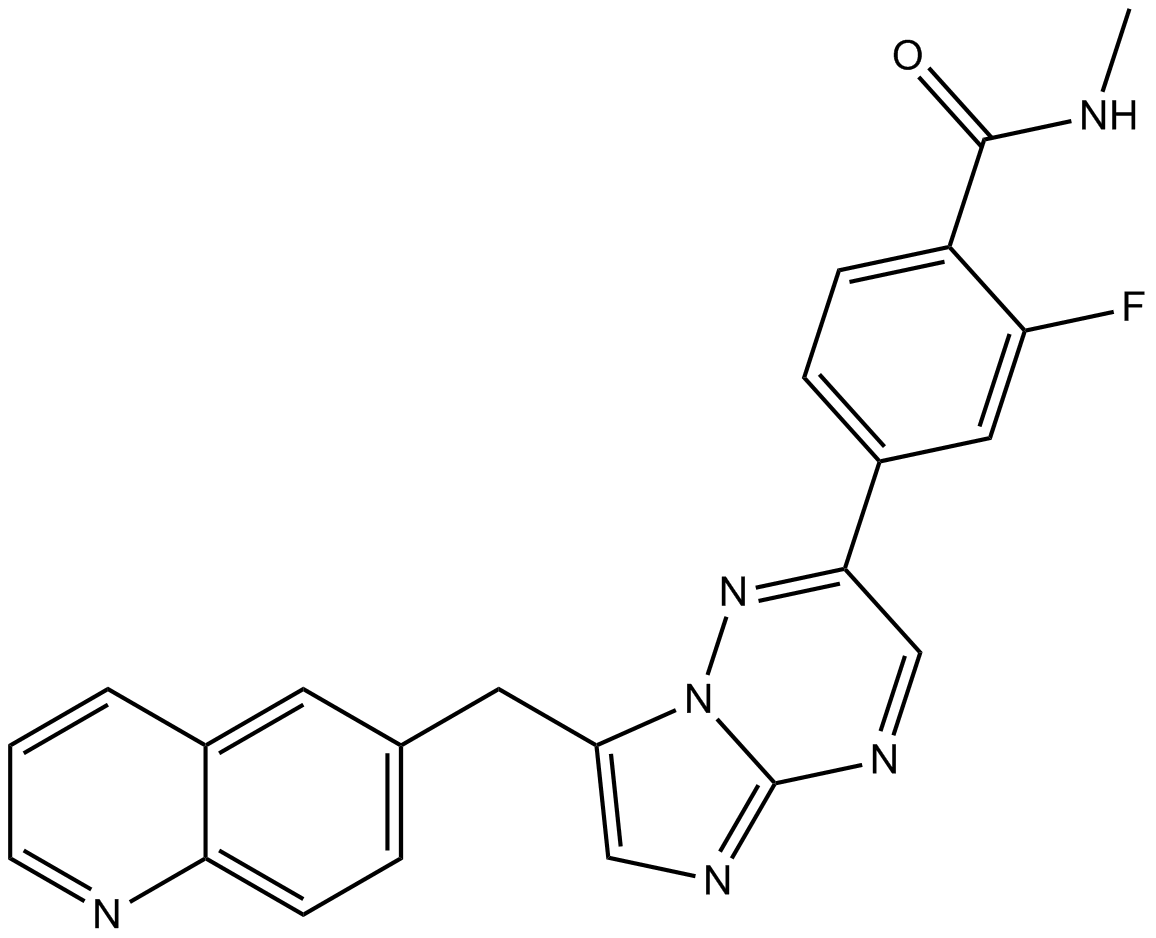
-
GC12585
JNJ-38877605
C-Met inhibitor,ATP-competitive
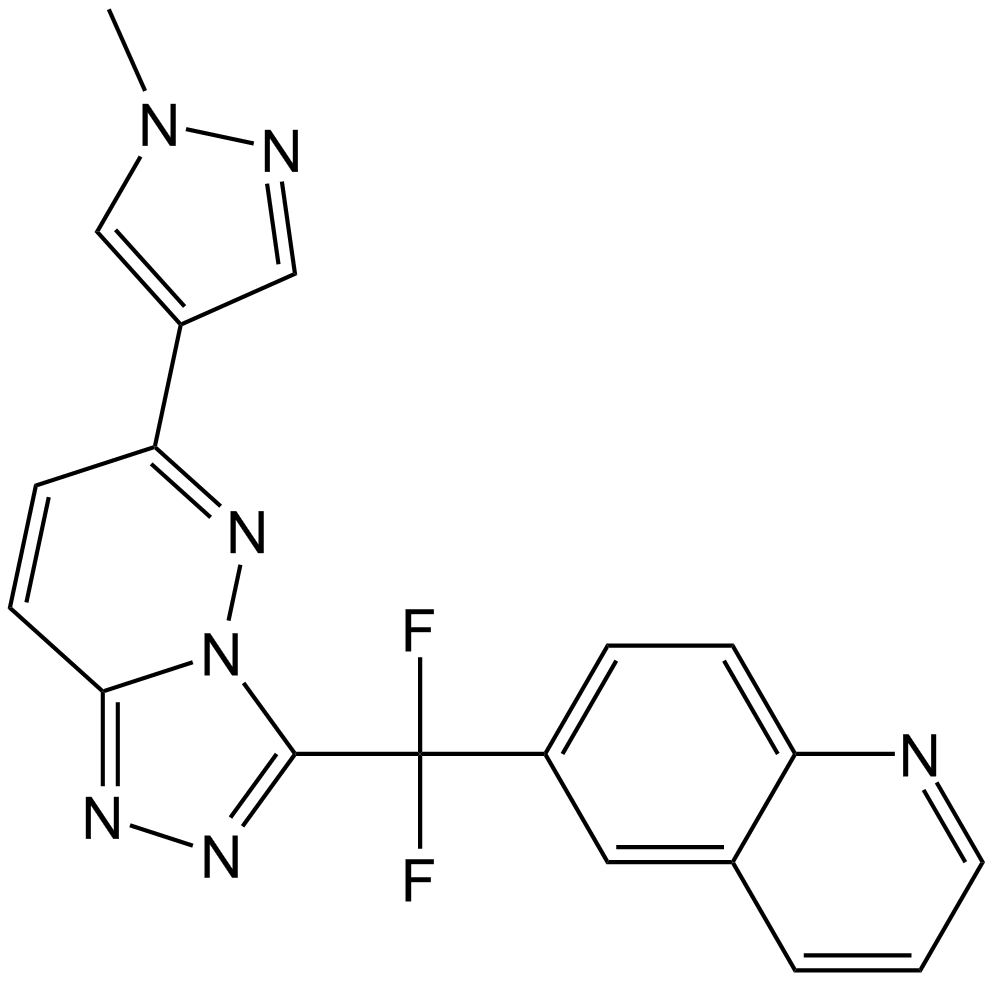
-
GC33266
JNJ-38877618
JNJ-38877618 is a potent, highly selective, orally bioavailable Met kinase inhibitor with IC50s of 2 and 3 nM for wild type and mutant Met, respectively.
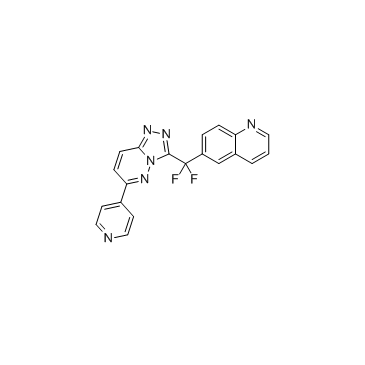
-
GC11057
LY2801653
A MET kinase inhibitor
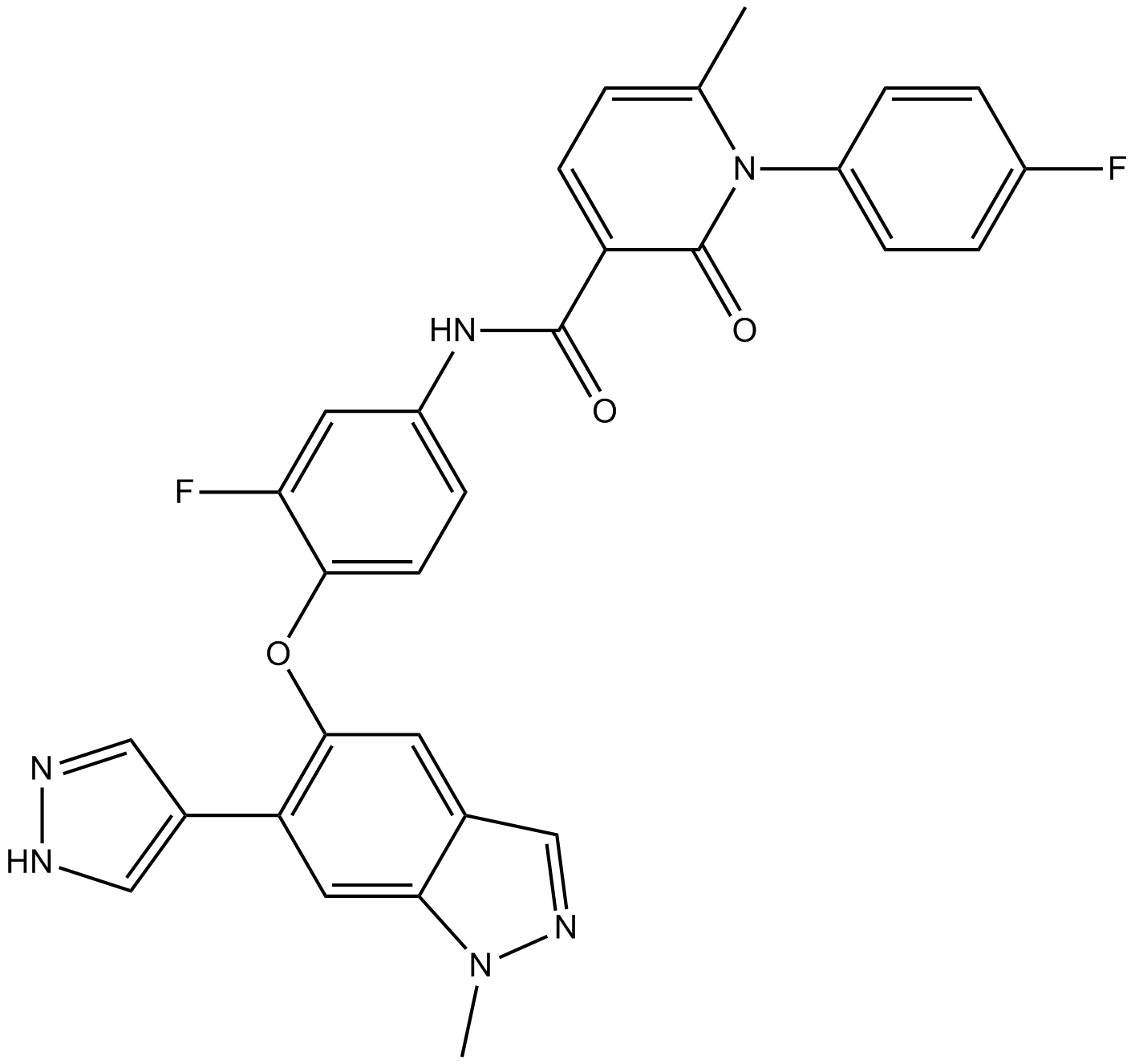
-
GC14951
Meleagrin
antibiotic
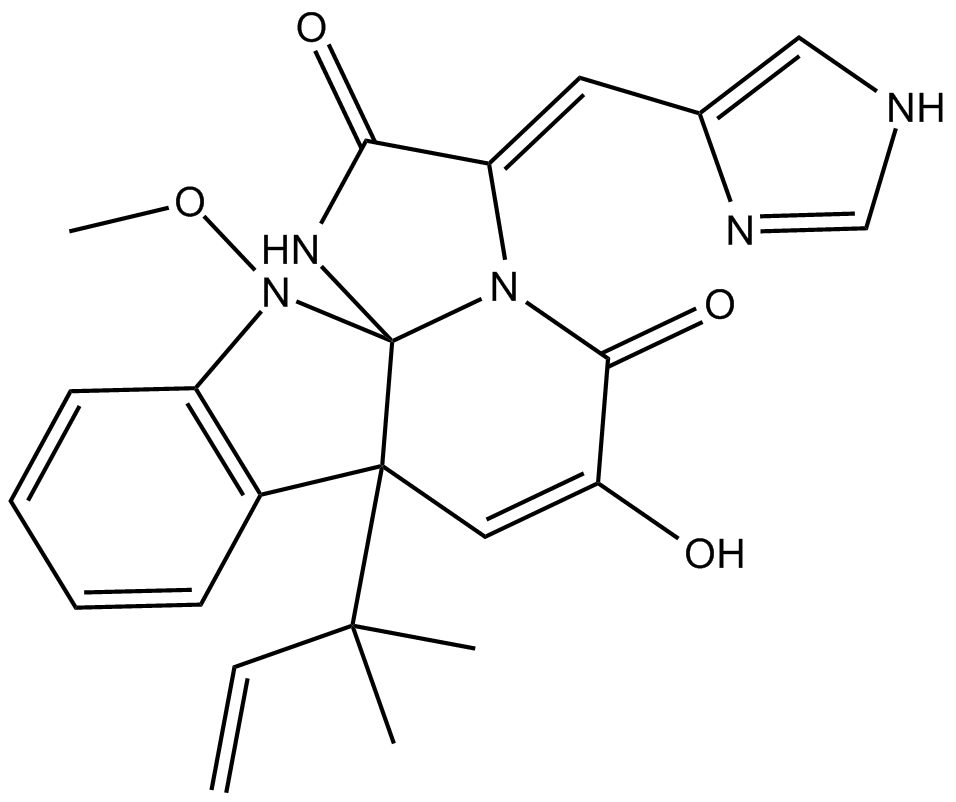
-
GC36585
Merestinib dihydrochloride
Merestinib dihydrochloride (LY2801653 dihydrochloride) is a potent, orally bioavailable c-Met inhibitor (Ki=2 nM) with anti-tumor activities. Merestinib dihydrochloride also has potent activity against MST1R (IC50=11 nM), FLT3 (IC50=7 nM), AXL (IC50=2 nM), MERTK (IC50=10 nM), TEK (IC50=63 nM), ROS1, DDR1/2 (IC50=0.1/7 nM) and MKNK1/2 (IC50=7 nM).
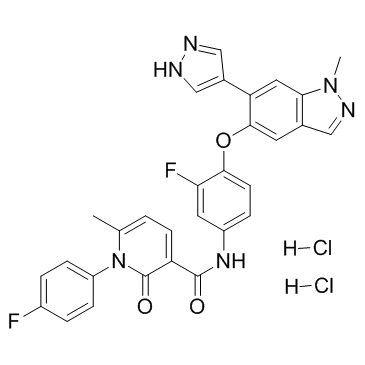
-
GC68018
MET kinase-IN-2
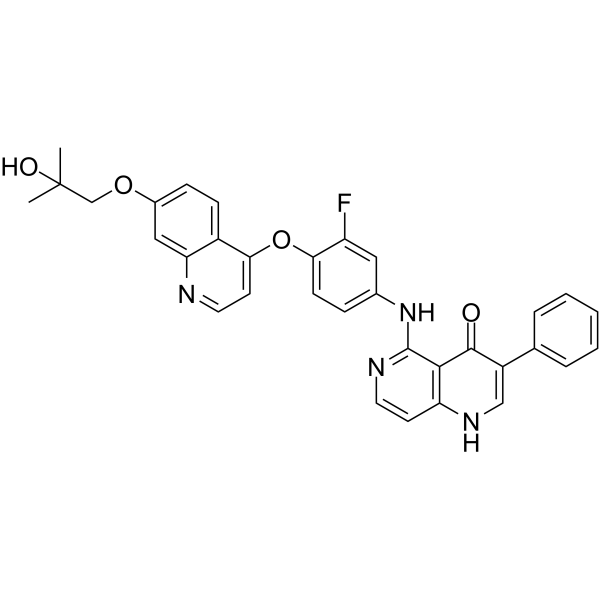
-
GC13598
MGCD-265
MGCD-265 is a potent and oral active inhibitor of c-Met and VEGFR2 tyrosine kinases, with IC50s of 29 nM and 10 nM, respectively. MGCD-265 has significant antitumor activity.
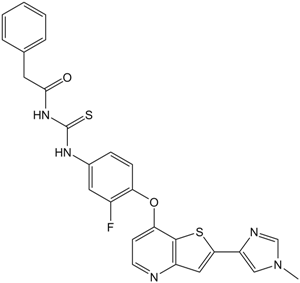
-
GC16337
MK-2461
C-Met (WT/mutants) inhibitor
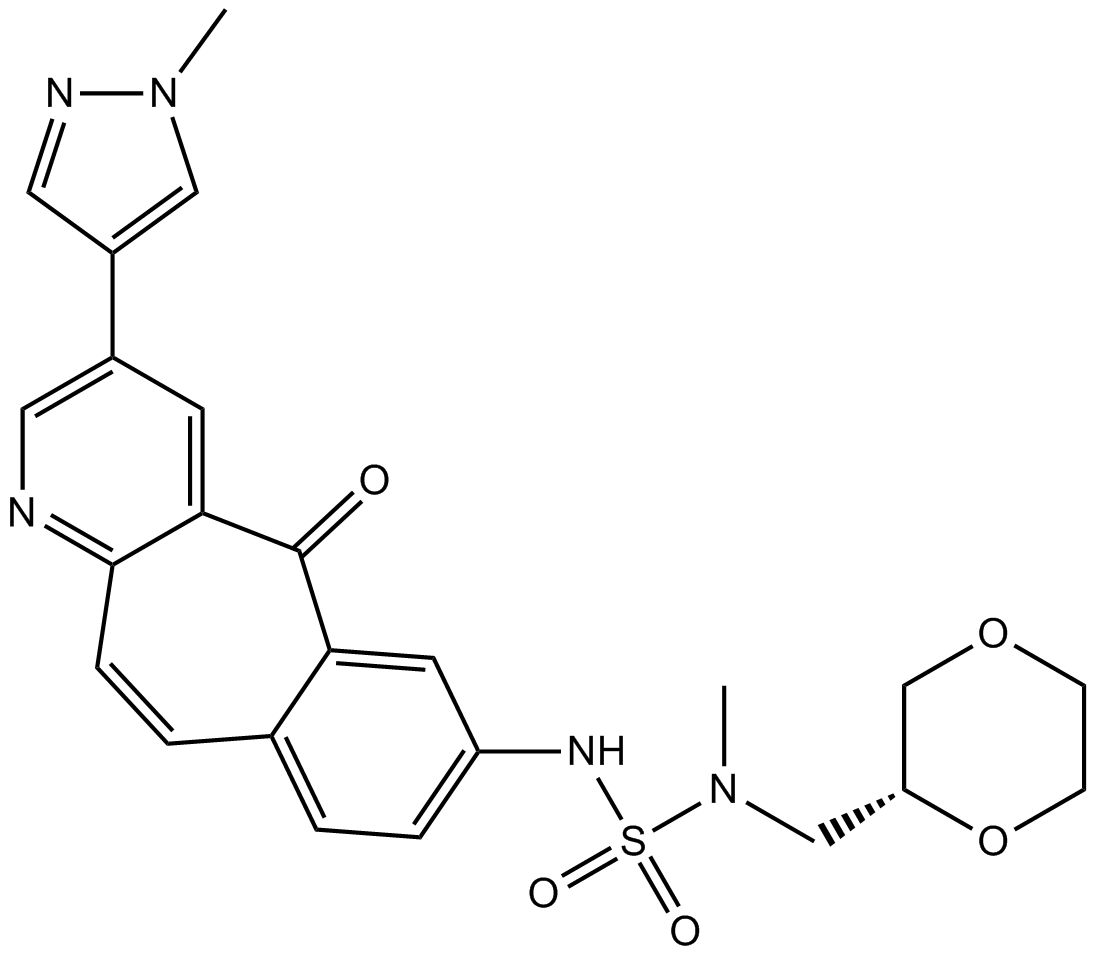
-
GC13140
MK-8033
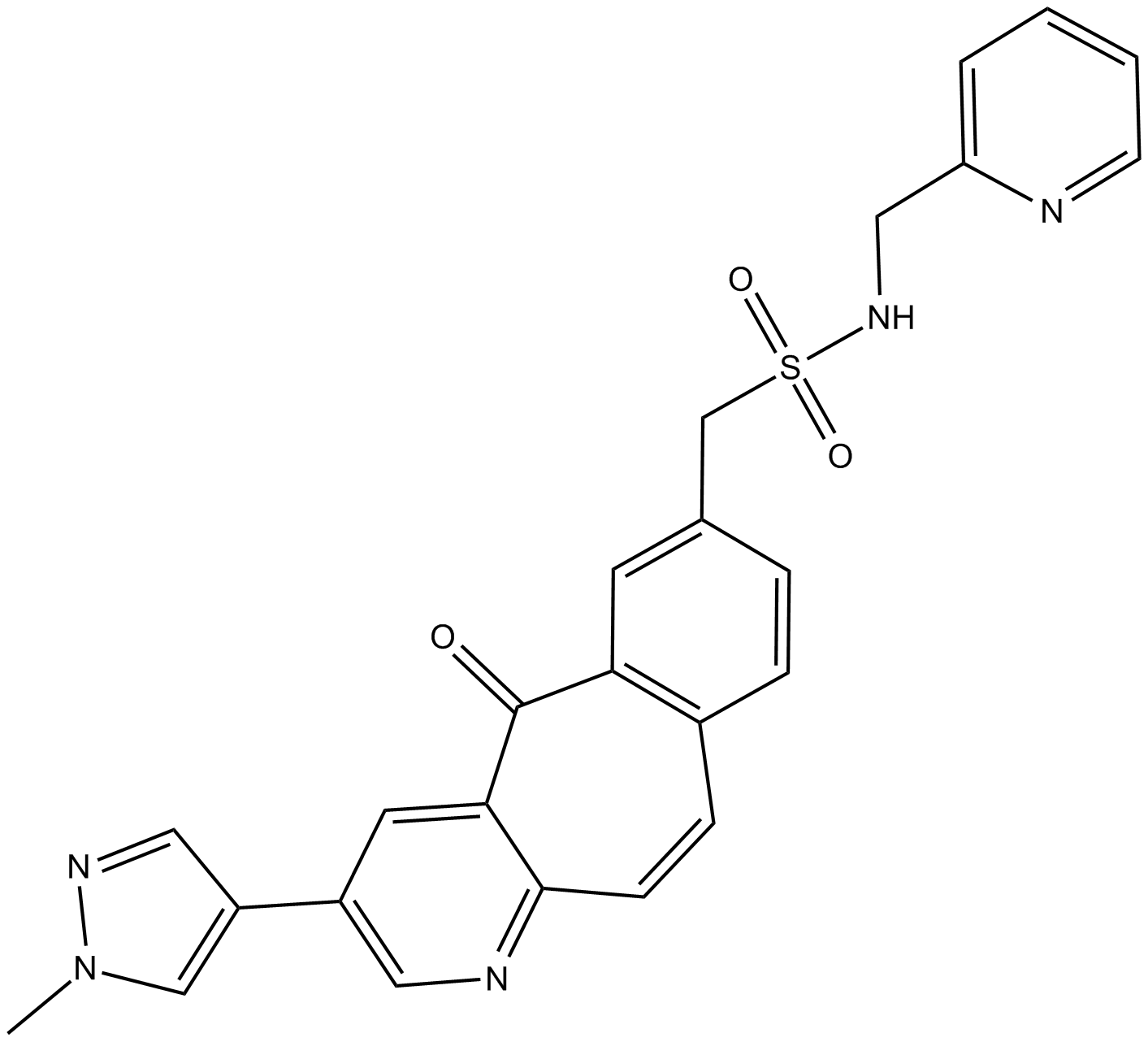
-
GC36625
MK-8033 hydrochloride
MK-8033 hydrochloride is an orally active ATP competitive c-Met/Ron dual inhibitor (IC50s: 1 nM (c-Met),7 nM (Ron)), with preferential binding to the activated kinase conformation. MK-8033 hydrochloride can be used in the research of cancers, such as breast and bladder cancers, non-small cell lung cancers (NSCLCs).
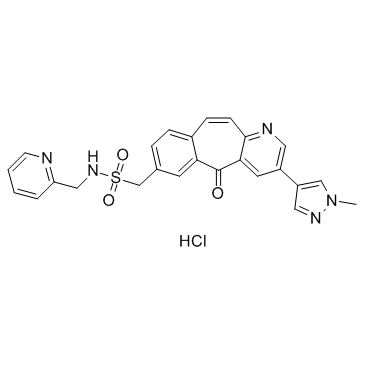
-
GC18211
Ningetinib
A multi-kinase inhibitor
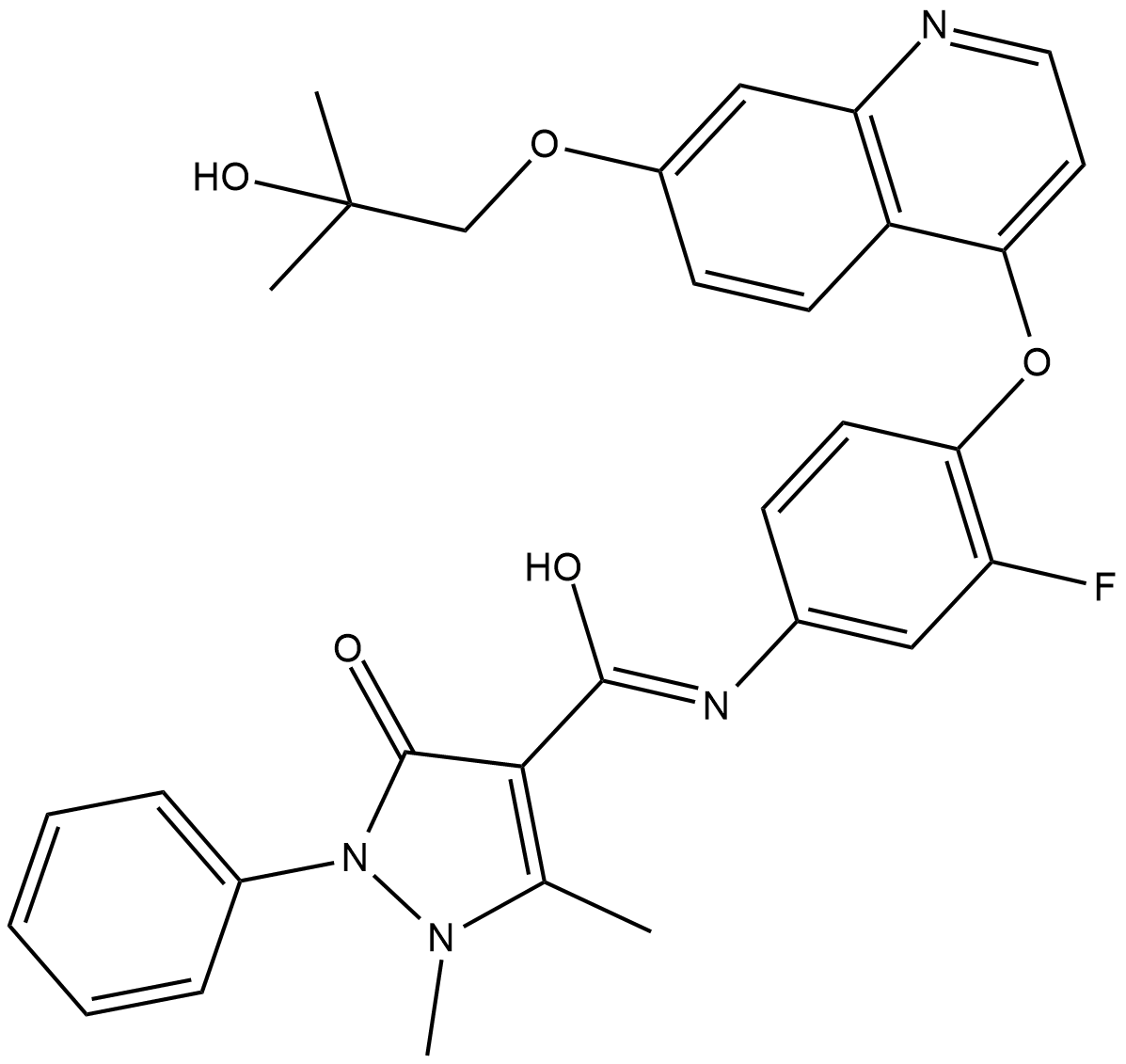
-
GC36744
Ningetinib Tosylate
Ningetinib Tosylate is a potent, orally bioavailable small molecule tyrosine kinase inhibitor (TKI) with IC50s of 6.7, 1.9 and <1.0 nM for c-Met, VEGFR2 and Axl, respectively.
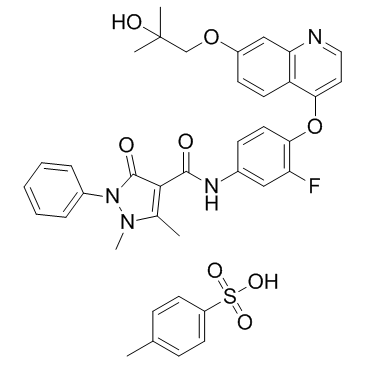
-
GC50152
Norleual
Highly potent HGF/c-MET inhibitor; also AT4 antagonist

-
GC69584
Norleual TFA
Norleual TFA is a type IV angiotensin (Ang) similar substance and a hepatocyte growth factor (HGF)/c-Met inhibitor with an IC50 of 3 pM. It is also an AT4 antagonist with strong anti-angiogenic activity.
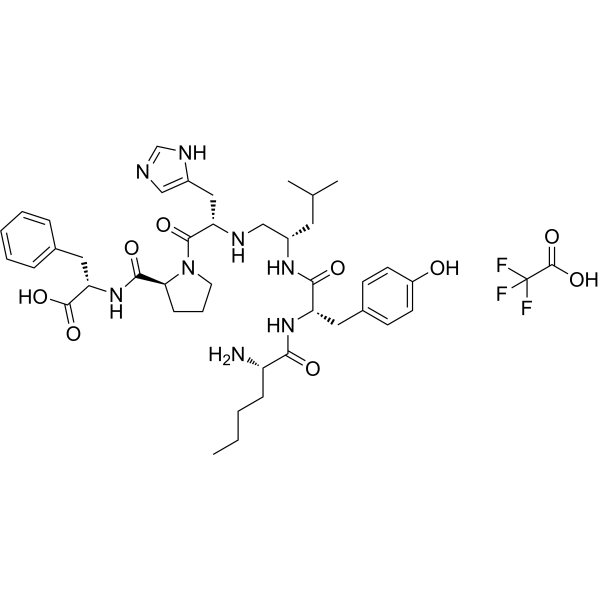
-
GC14488
NPS-1034
MET inhibitor
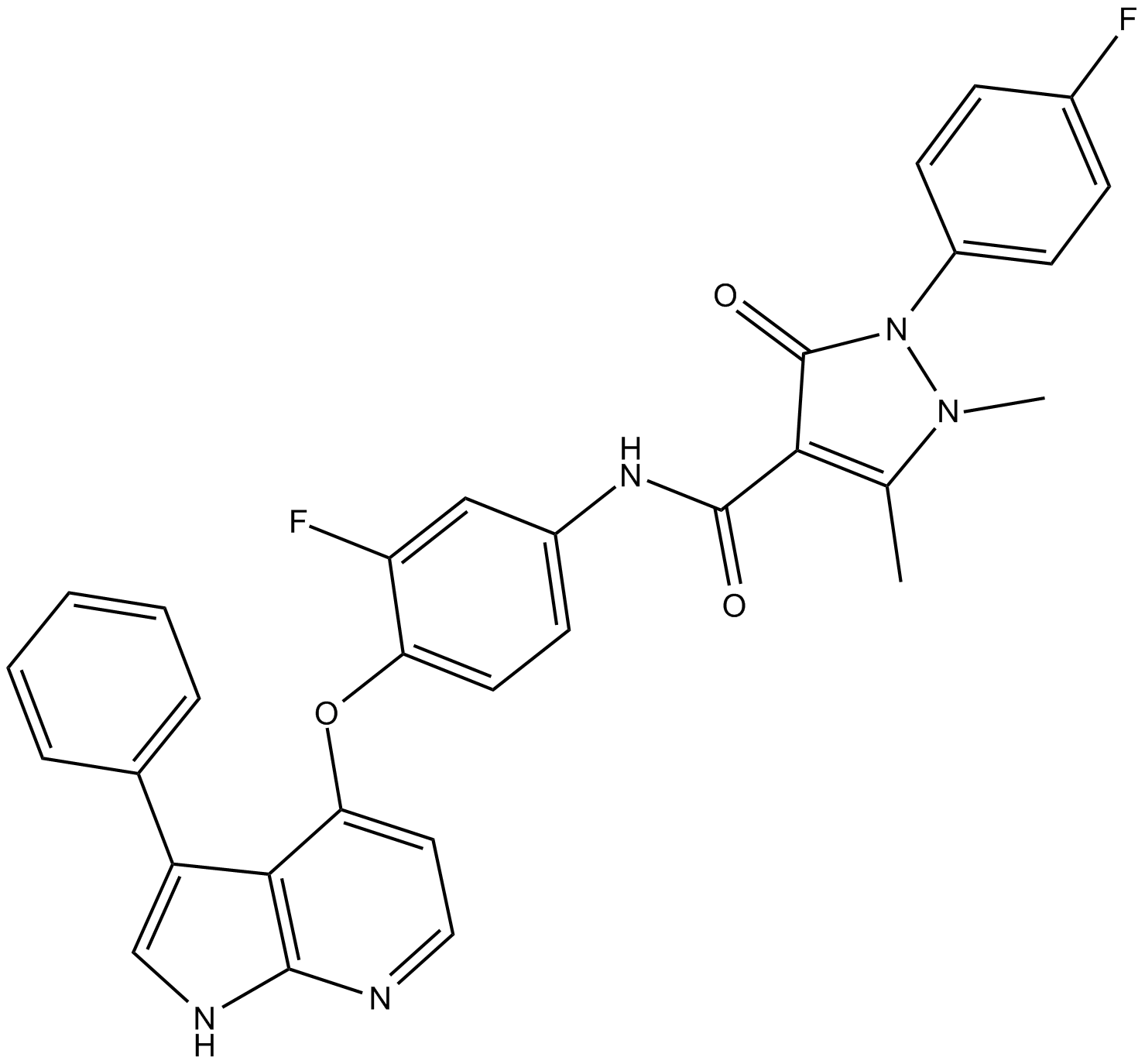
-
GC16972
NVP-BVU972
C-Met inhibitor,potent and selective
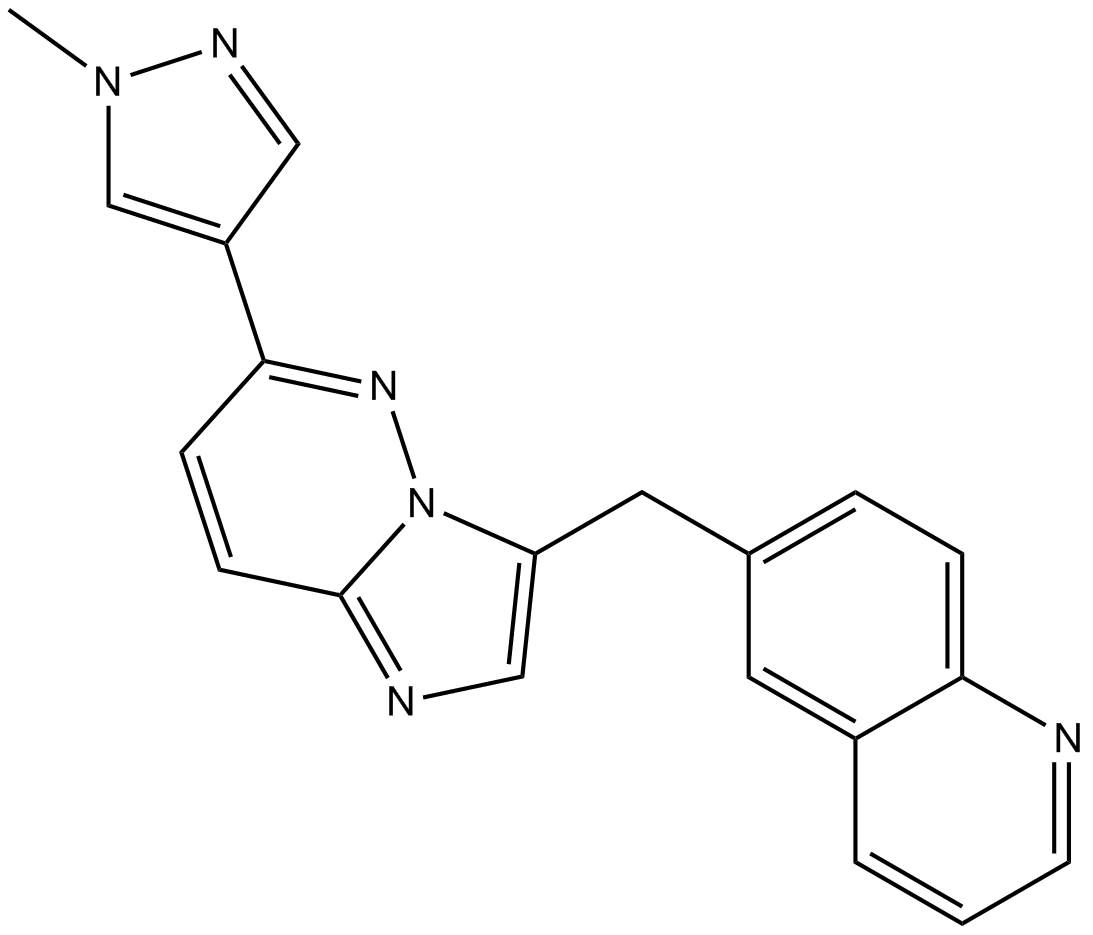
-
GC69623
Onartuzumab
Onartuzumab (MetMAb) is a humanized, affinity-matured monoclonal antibody that inhibits the receptor tyrosine kinase MET. Onartuzumab effectively inhibits HGF binding, receptor phosphorylation and signal transduction. Onartuzumab has antibody-like pharmacokinetics and anti-tumor activity.

-
GC12729
PF-04217903
C-Met inhibitor,selective and ATP-competitive
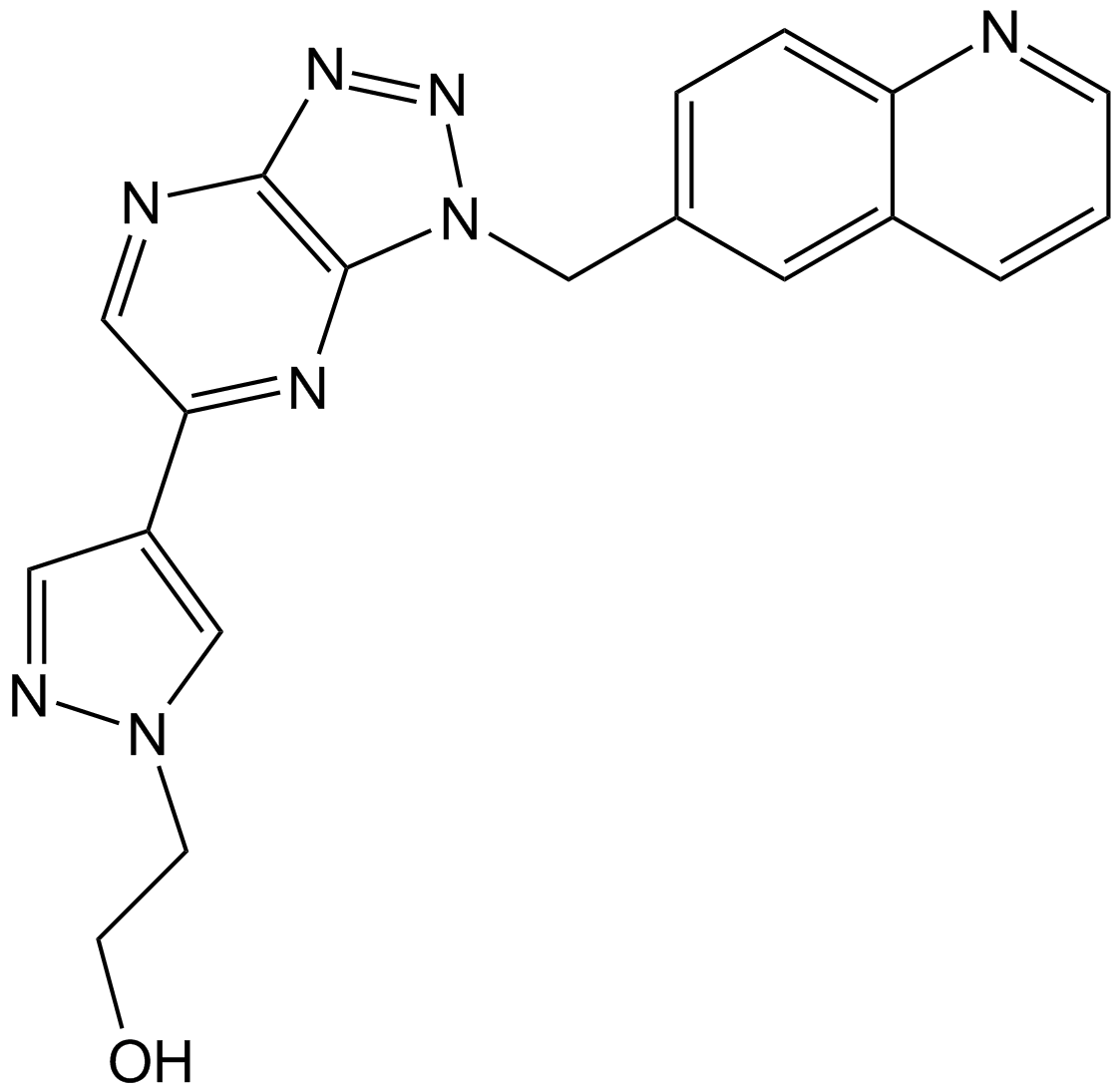
-
GC15733
PF-04217903 methanesulfonate
A c-Met inhibitor
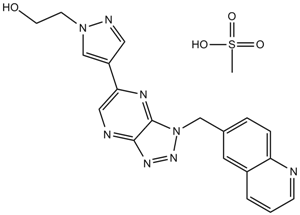
-
GC11733
PHA-665752
C-Met inhibitor,potent and ATP-competitive
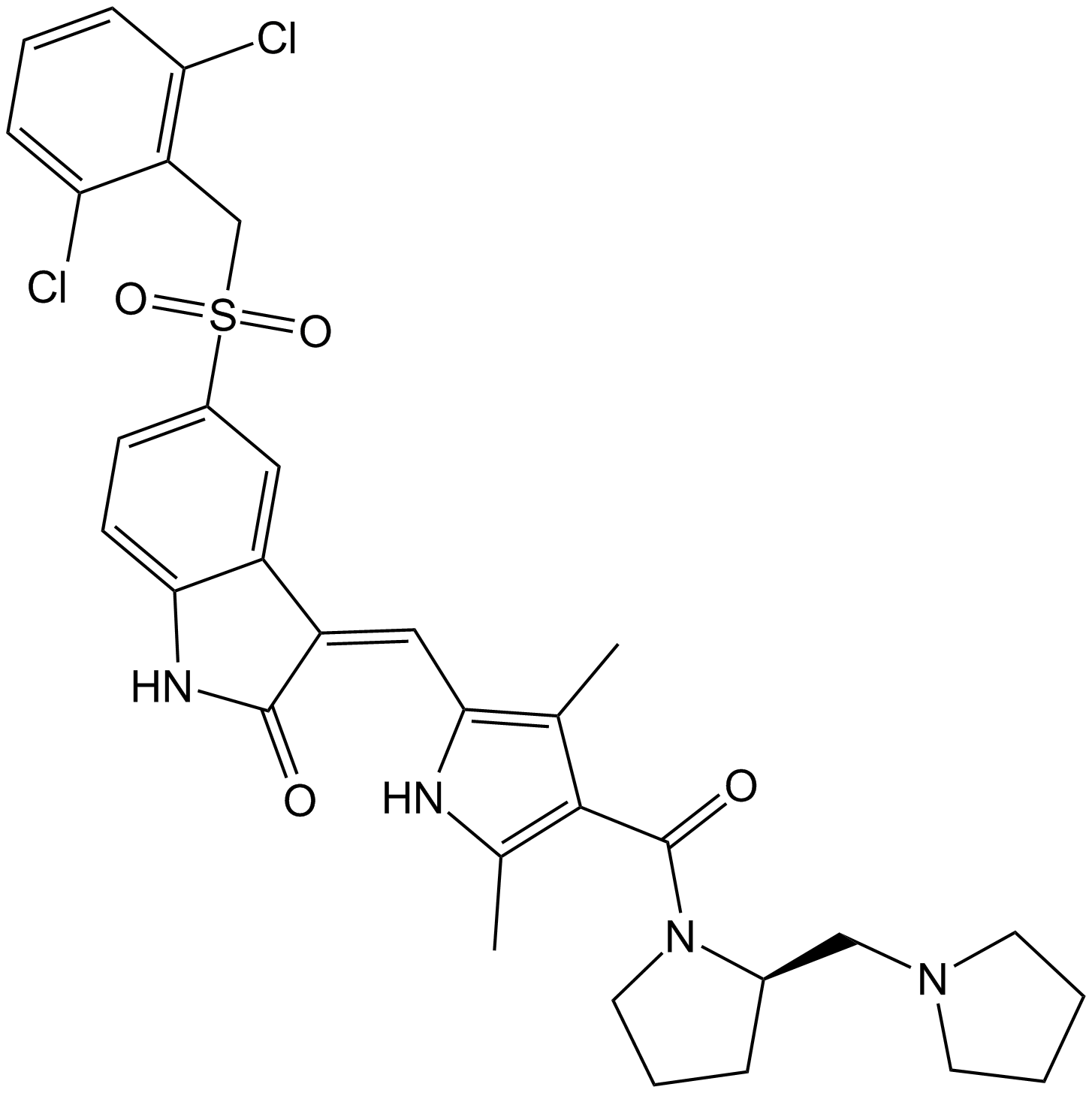
-
GC69817
Rilotumumab
Rilotumumab (AMG 102) is a monoclonal antibody that targets the hepatocyte growth factor (HGF), inhibiting HGF/MET-driven signaling. Rilotumumab has anti-tumor activity and is being studied for use in castration-resistant prostate cancer (CRPC) and solid tumors.

-
GC19317
S49076
S49076 is a novel, potent inhibitor of MET, AXL/MER, and FGFR1/2/3 with IC50 values below 20 nM.
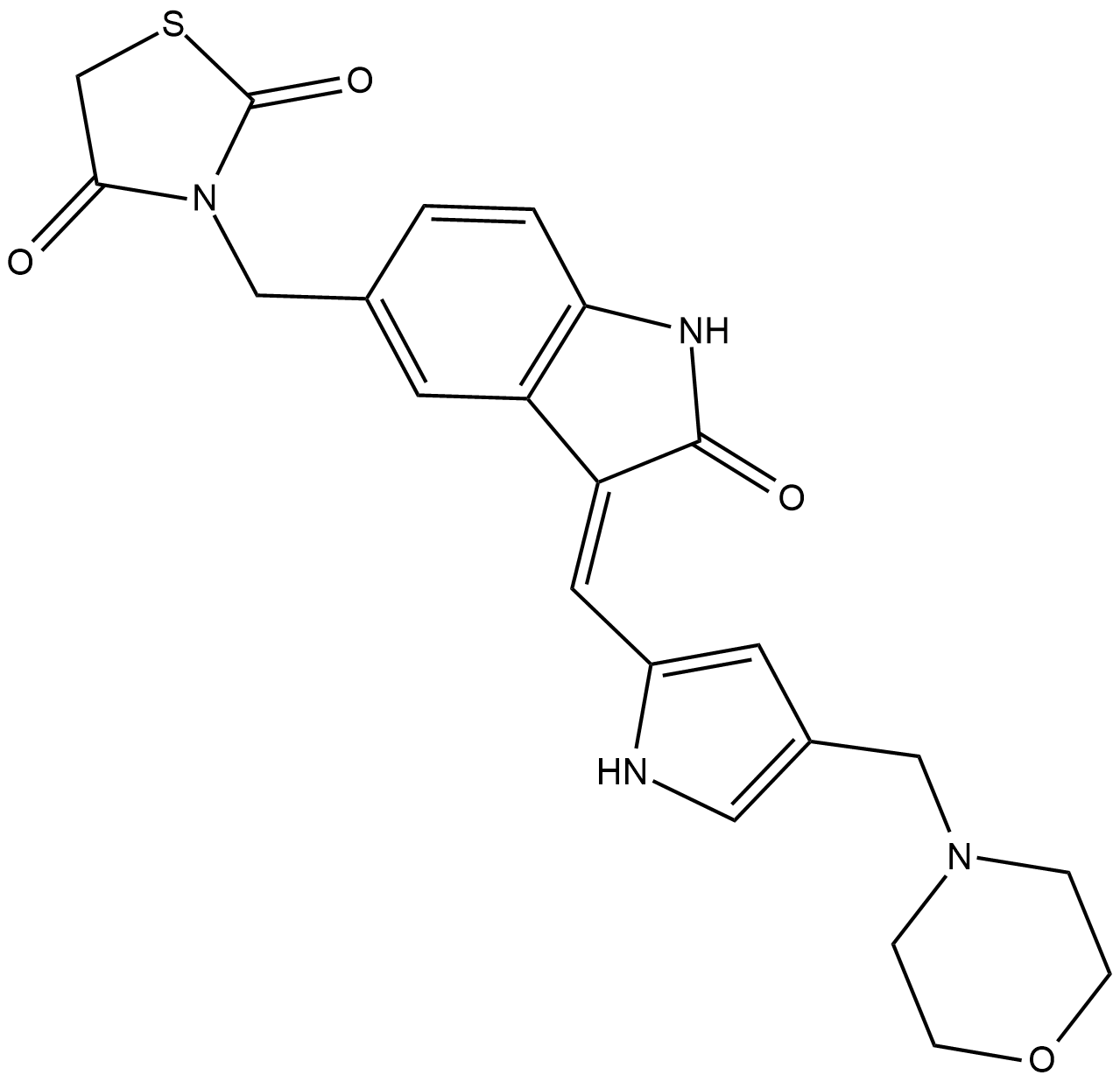
-
GC33189
SAR125844
SAR125844 is a potent, highly selective, reversible and ATP-competitive MET receptor tyrosine kinase (RTK) inhibitor, with an IC50 of 4.2 nM. Shows inhibition of MET autophosphorylation in cell-based assays.
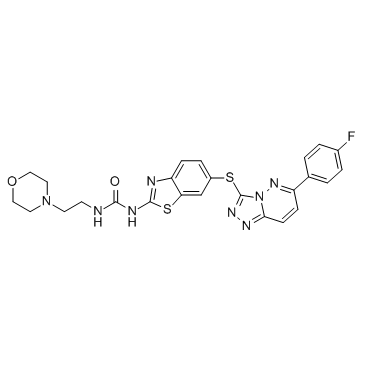
-
GC19321
Savolitinib
Savolitinib (AZD6094) ia highly potent and selective c-Met inhibitor with an IC50 of 5 nM.
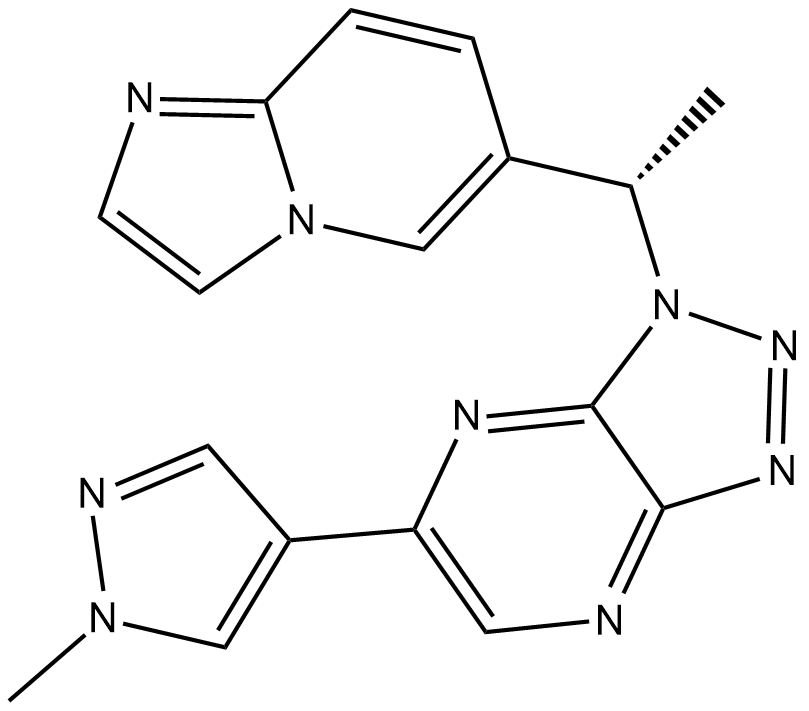
-
GC19108
SCR-1481B1
SCR-1481B1 (c-Met inhibitor 2) is a potent compound that has activity against cancers dependent upon Met activation and also has activity against cancers as a VEGFR inhibitor.
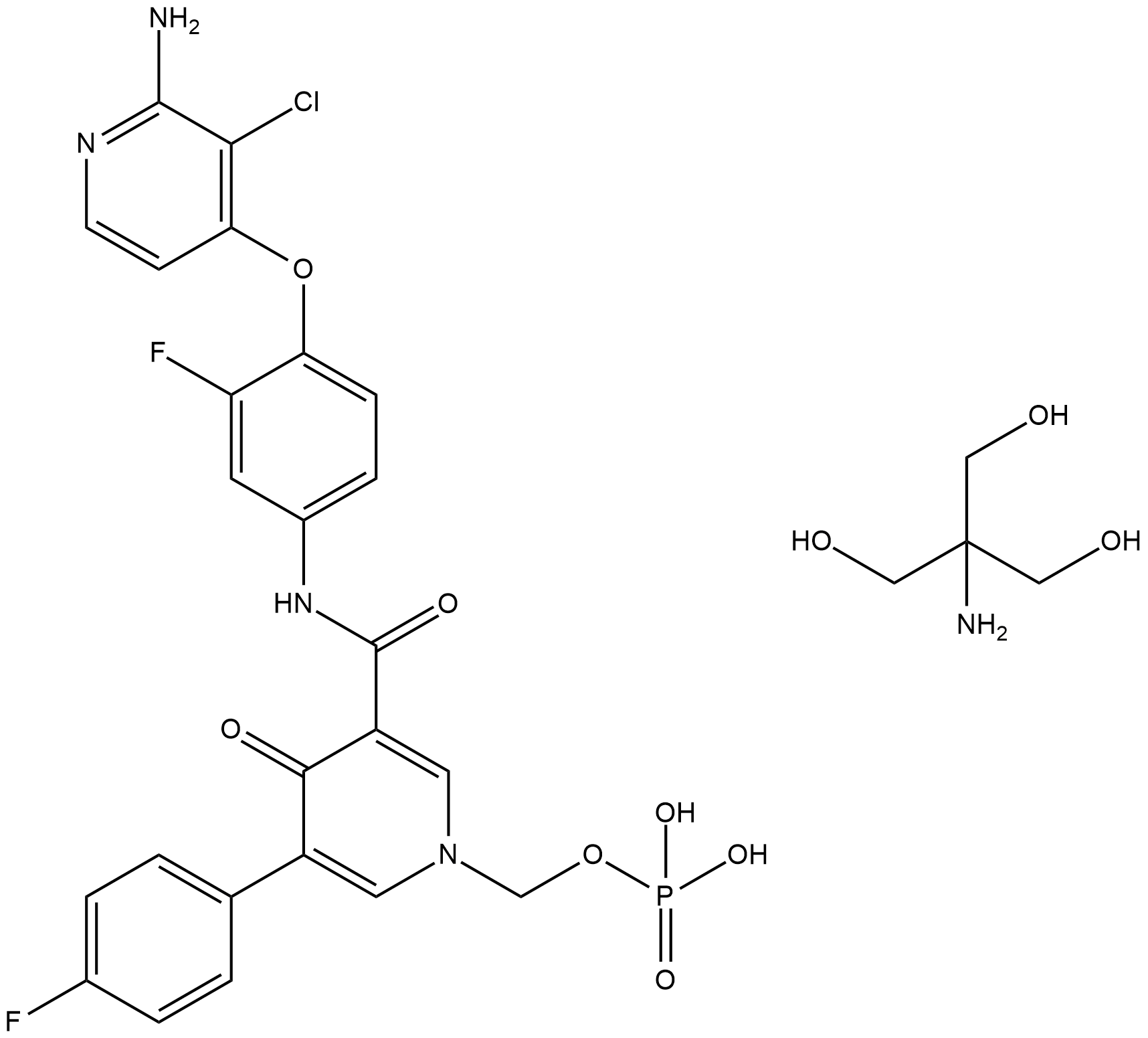
-
GC15664
SGX-523
MET inibitor, highly selective, ATP-competitive
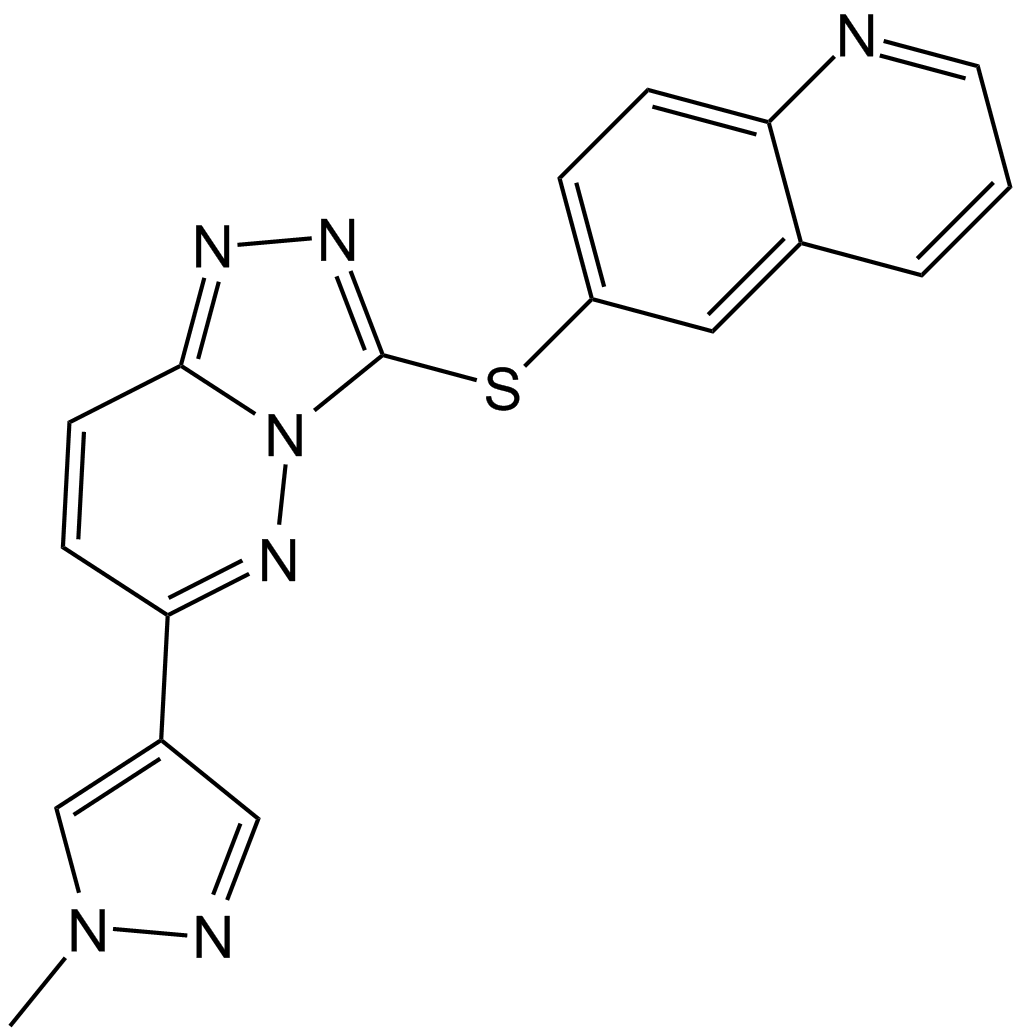
-
GC34811
SRI 31215 TFA
SRI 31215 (TFA) is a Matriptase/Hepsin/hepatocyte growth factor activator (HGFA) triplex inhibitor and mimics the activity of HAI-1/2 (endogenous inhibitors of HGF activation). SRI 31215 has potent inhibitory activity against matriptase, hepsin and HGFA with IC50 values of 0.69 μM, 0.65 μM and 0.30 μM, respectively. SRI 31215 can be used for the research of cancer.
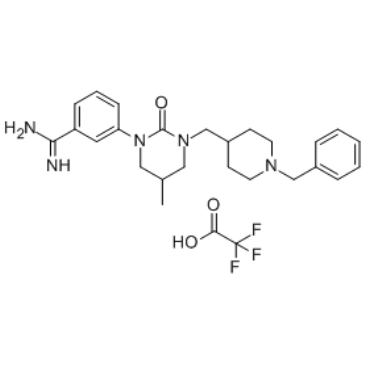
-
GC11089
SU11274
C-Met inhibitor,potent and selective
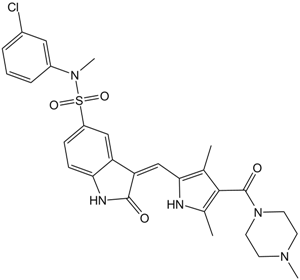
-
GC15307
SU5416
A tyrosine kinase inhibitor
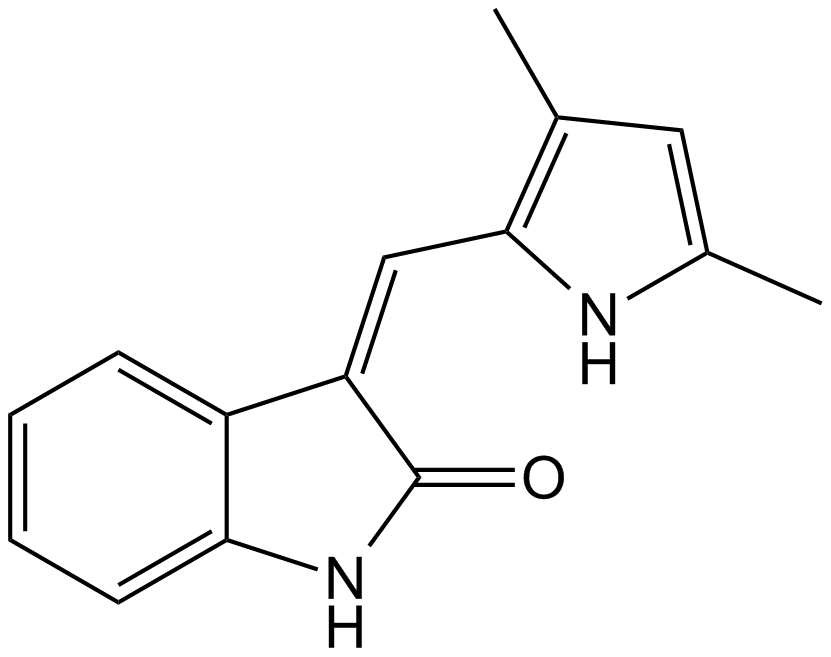
-
GC62268
SYN1143
SYN1143 is a potent, selective and orally active dual inhibitor of c-Met/RON, with IC50s of 4 and 9 nM, respectively. SYN1143 has weak inhibitory activity on Lck, Tie2, Src, and BTK with IC50s ranging from 160 to 710 nM. SYN1143 can be used for the research of cancers that RON and c-Met are activated.
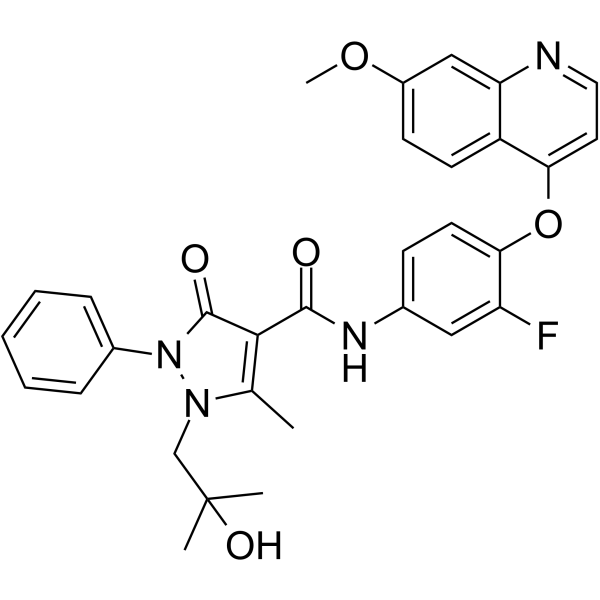
-
GC33173
TAS-115
TAS-115 (TAS-115) is a potent VEGFR and hepatocyte growth factor receptor (c-Met/HGFR)-targeted kinase inhibitor with IC50s of 30 and 32 nM for rVEGFR2 and rMET, respectively.
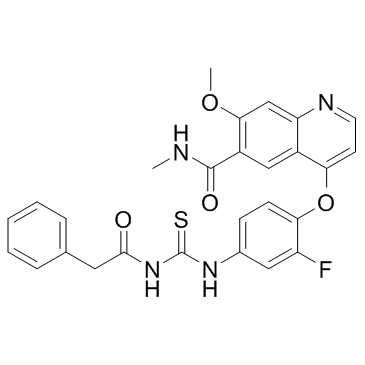
-
GC33273
TAS-115 mesylate (TAS-115 methanesulfonate)
Pamufetinib (TAS-115) mesylate is a potent VEGFRand hepatocyte growth factor receptor (c-Met/HGFR)-targeted kinase inhibitor, with IC50s of 30 and 32 nM for rVEGFR2 and rMET, respectively.
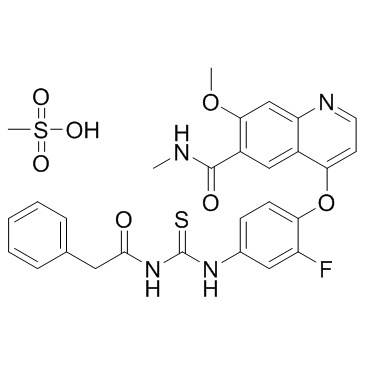
-
GC63215
Terevalefim
Terevalefim (ANG-3777), an hepatocyte growth factor (HGF) mimetic, selectively activates the c-Met receptor.
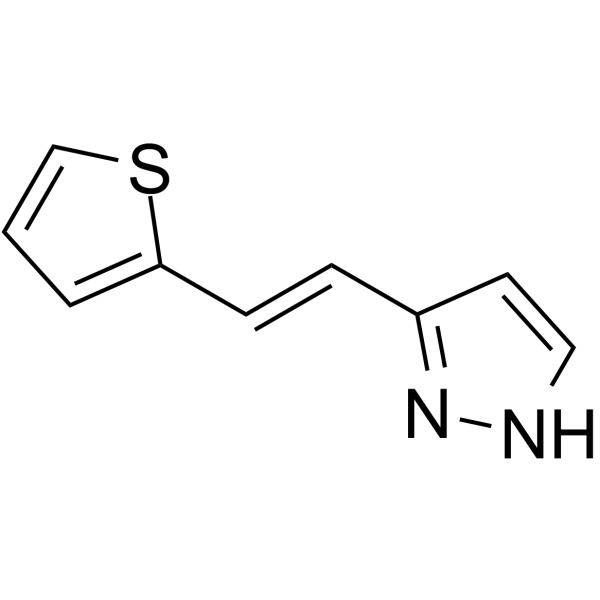
-
GC14256
Tivantinib (ARQ 197)
Tivantinib (ARQ 197) is a highly selective c-Met tyrosine kinase inhibitor with a Ki of 355 nM.
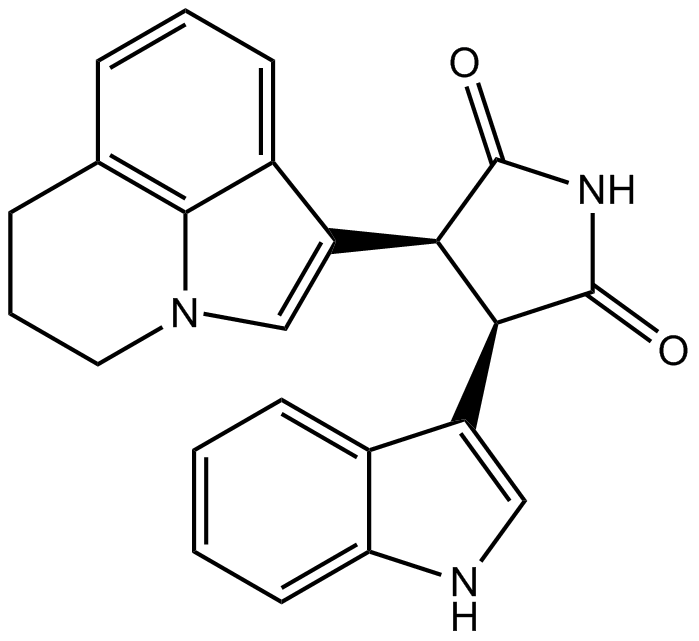
-
GC70077
Tunlametinib
Tunlametinib is an anti-tumor compound and a tyrosine kinase inhibitor.
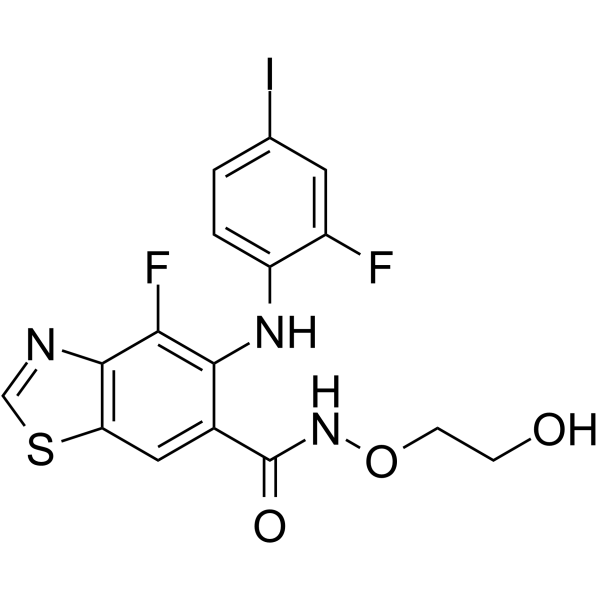
-
GC37849
Tyrosine kinase inhibitor
Tyrosine kinase inhibitor is a potent tyrosine kinase inhibitor.
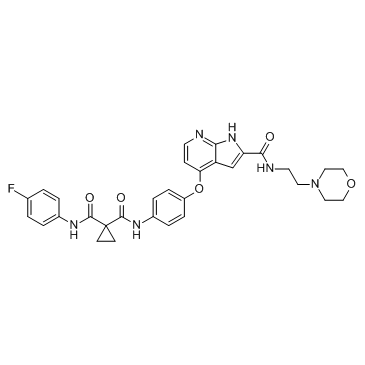
-
GC19140
X-376
X-376 is a potent and dual ALK/MET inhibitor with IC50s of 0.61 nM and 0.69 nM, respectively.
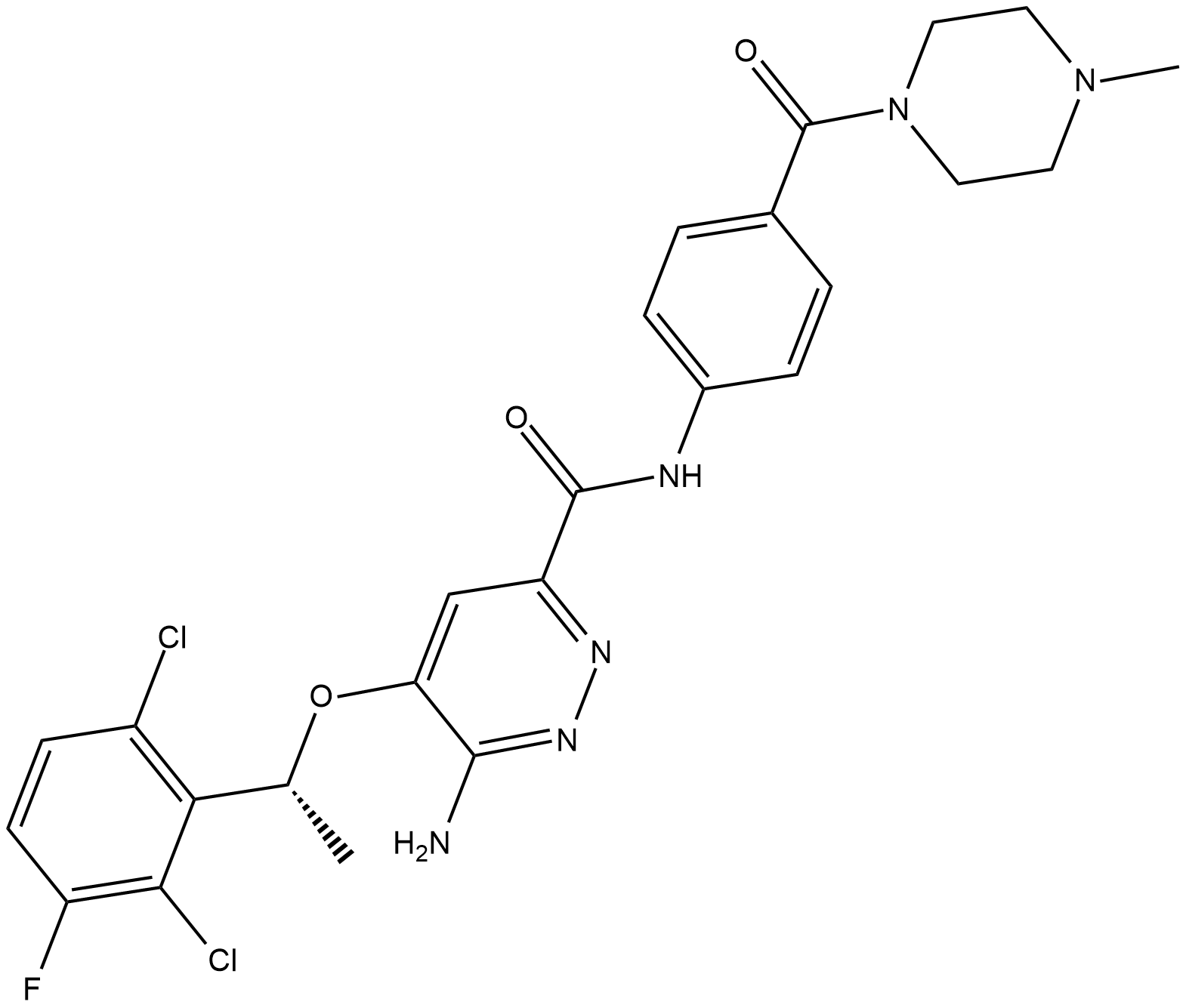
-
GC62266
XL092
XL092 is an orally active, ATP-competitive inhibitor of multiple receptor tyrosine kinases (RTKs) including MET, VEGFR2, AXL and MER, with IC50s in cell-based assays of 15 nM, 1.6 nM, 3.4 nM, 7.2 nM respectively. XL092 exhibits anti-tumor activity. XL092 has the potential for kinase-dependent diseases and conditions research.
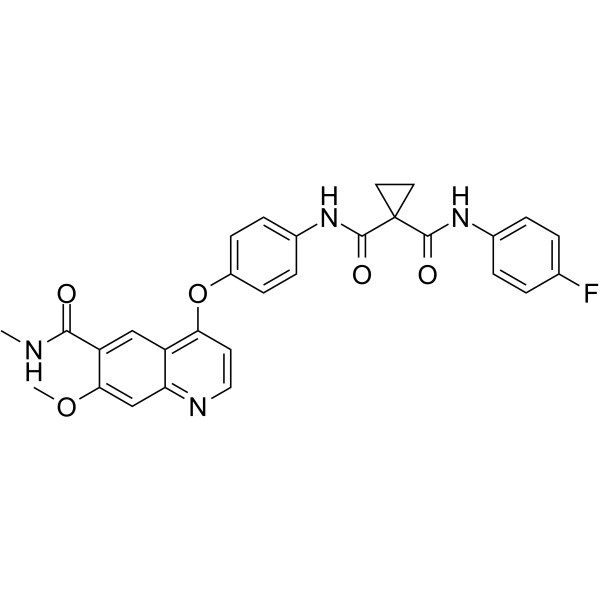
-
GC11555
ZM 323881 HCl
ZM 323881 HCl is a potent and selective VEGFR2 inhibitor with an IC50 of less than 2 nM.
